BY NICHOLAS IBEKWE/PREMIUM TIMES
One afternoon in July 2013 while descending the stairs of a Lagos hospital where she worked as an auxiliary nurse, Abosede Oriabure, 45, heard a snap in her left knee. She felt a sharp pain.
The pain persisted for a few minutes but later subsided. Although the pain did not completely disappear, it was nothing serious beyond a mild ache and she did not think much about it. But days later, the pain returned with a vengeance. Her knee was practically burning from the inside. She could barely lift her left leg. To ease the unrelenting pain, Oriabure resorted to self-medication. She used Tramadol, a recently banned painkiller, oxycodone and other similarly addictive analgesics.
But the pain never went away. In fact, it got worse.
Advertisement
As the pain became increasingly excruciating, she visited an orthopaedic doctor, who recommended she did an MRI scan to determine why the pain had persisted. The cost of the MRI scan was N85,000.00. Unemployed and barely scraping a living, the mother of three could not raise the money. She resigned to taking the addictive painkillers to get by one day at a time. When she thought things could not get worse, one Sunday in August 2018 she woke up and discovered that her left knee had twisted into an arc giving her a K-shaped stance when she managed to stand upright.
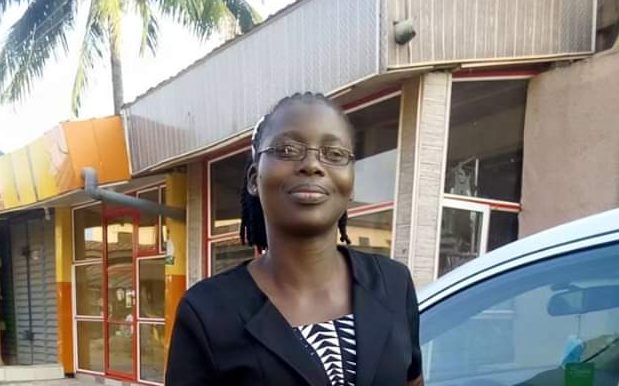
After months of enduring excruciating pains, she managed to do the MRI scan in September 2019 after her husband took a loan from a consumer credit finance firm. Although she has been told she may be needing a knee replacement surgery, her doctor told her that the pressure on the knee during the six years she waited before seeking professional help may have caused irreparable damage to the knee.
“My condition would have been better if I had done the MRI scan in 2013 or soon after and started treatment then. But I couldn’t raise N85,000 then,” she said.
Advertisement
Oriabure’s story is not an isolated case. Without universal health coverage, the majority of Nigerians are unable to pay for their health bills, including the cost of essential medical diagnosis, resulting in a spike in medical complications and deaths.
A 2019 survey by, one of the country’s top polling organisations, NOI Polls, revealed that at least 89 per cent pay for healthcare services out-of-pocket. But while millions of Nigerians are increasingly struggling to pay for life-saving healthcare bills, including payment for vital medical diagnosis, doctors, hospitals, and medical diagnostic services providers are defrauding them of billions of naira yearly through a fraudulent medical referral kickback scam, a PREMIUM TIMES investigation spanning 20 months has revealed.
This criminal, multi-billion naira fee-splitting scheme, cut, or rebate, as it is commonly known in the healthcare sector, is done in such a way that medical laboratories hike the cost of medical tests, by at least 20 per cent, and as high as 35 per cent, which is later paid to the referring doctors or hospitals.
In addition to hiking the cost of medical test, some medical laboratory providers also actively encourage doctors and hospitals to upsell unsuspecting customers for medical diagnosis they recommend. Insiders in the health sectors also told PREMIUM TIMES that some doctors prescribe tests patients do not need just so they can earn kickbacks from laboratories.
Advertisement
Our investigation uncovered the rotten underbelly of a sector where the rules are made by the profiteering owners of diagnostics centres, and physicians, who without remorse, steal from their patients in blatant violation of the Hippocratic Oaths they swore to uphold, the Code of Medical Ethics of the Medical Dental Council of Nigerian, and the Rules of Professional Conduct for Medical Laboratory Scientists, laboratory technicians and laboratory assistants.
How patients are defrauded
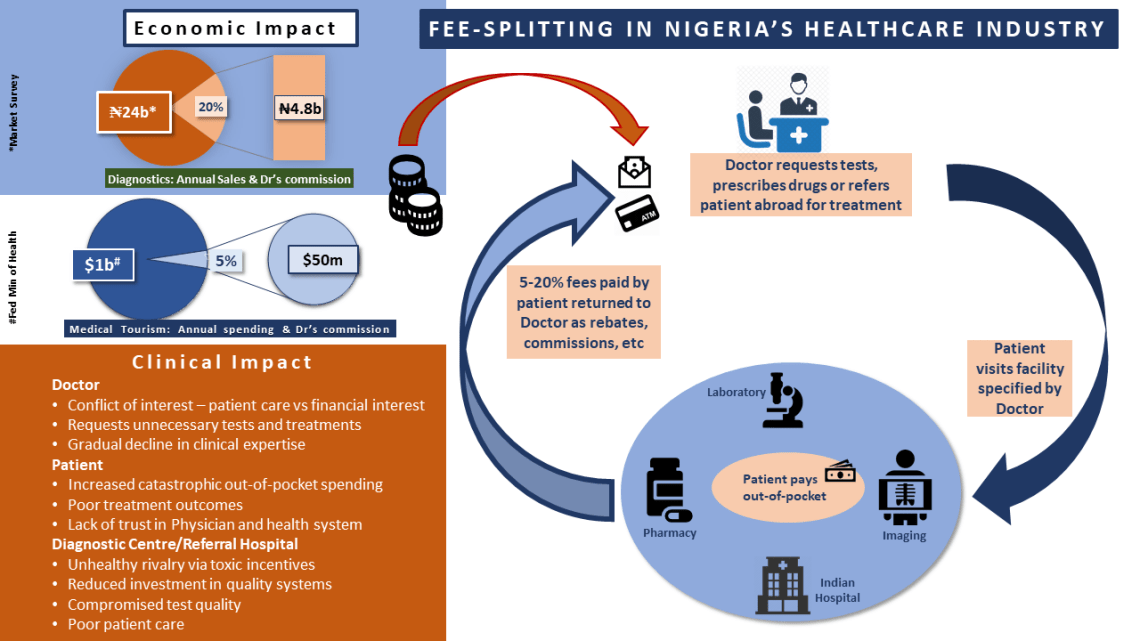
Posing as a physician, this reporter, for over 20 months painstakingly sent people to do several medical tests in at least nine of the country’s biggest medical laboratories using referral forms obtained from sales representatives of the diagnostic laboratories.
While all the diagnostic laboratories agreed to pay this reporter a 10 per cent to 20 per cent cut of the fee they charged for diagnosis or encouraged the reporter to upsell the fee for medical tests to patients, only six of them actually credited this reporter’s bank accounts with the agreed kickback.
Advertisement
PREMIUM TIMES covered the costs of the tests as well as funded the patients’ transportation to the laboratories.
The scheme is such that diagnostic centres first register doctors and hospitals with their bank account details and the kickbacks due to doctors for referring patients to them are usually calculated at the end of each month and transferred to doctors’ bank accounts.
Advertisement
Two of the diagnostic centres even made this reporter sign “memorandum of understanding” to pay him a kickback which is described with deodorised terms like “B2B prices”, “mutually beneficial partnership”, “hourly rate” and “physician fee”.
In all but one instance, the diagnostic centres did not care to check if this reporter was indeed a physician as he claimed, neither did they authenticate the name of the fictitious clinic he gave them nor insisted on visiting him at the clinic he claimed he worked for before handling him their referral booklets.
Advertisement
In fact, all the diagnostic referral forms used to refer people for tests were handed to this reporter at malls, restaurants, and other public places. One diagnostic centre even had its dispatch rider deliver it at an address that isn’t a hospital.
Me Cure Healthcare’s HelloDoc Referrals App
Advertisement
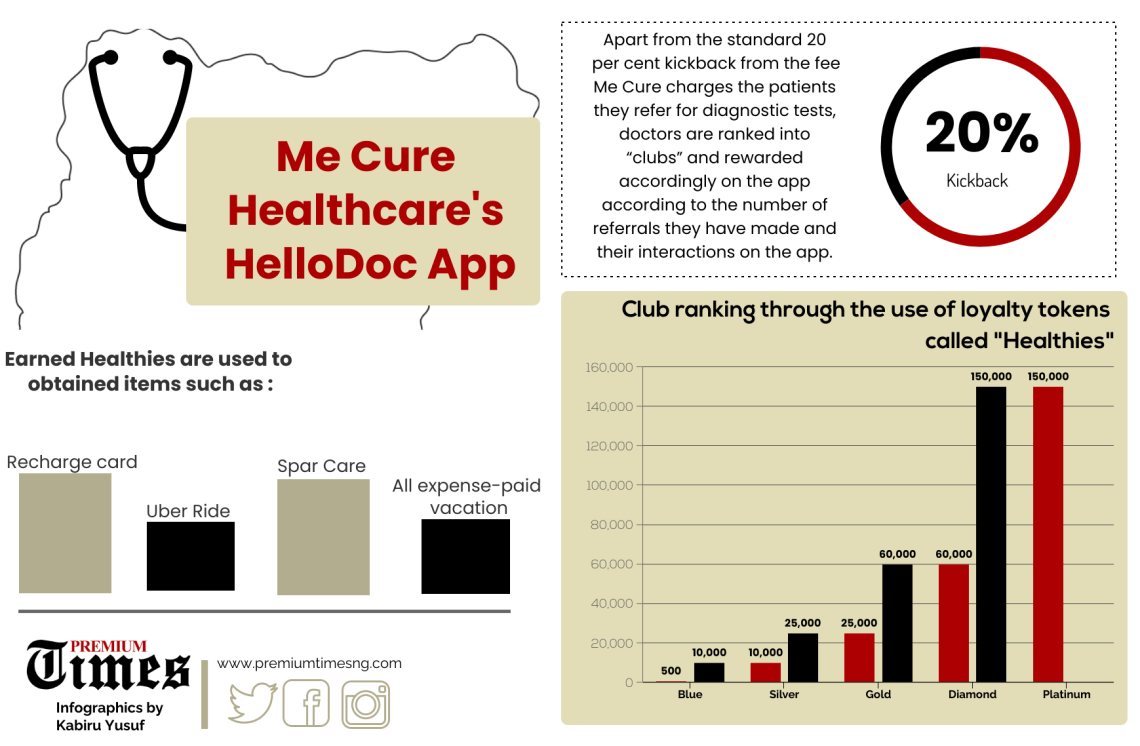
Indian-owned Me Cure Healthcare headquartered at Oshodi, Lagos, is one of the biggest medical laboratories in the country. The company has six branches across the country including an Eye Centre. It is also planning to set up what it describes as West Africa’s biggest oncology centre that will provide services such as cancer diagnostics, radiotherapy and chemotherapy.
Me Cure Healthcare’s parent company – Me Cure Industries Limited –is also into production and marketing of generic drugs, dietary supplements, healthcare-focused IT and e-commerce for healthcare.
The private limited liability company was registered in Nigeria in 2005 by the Samir Udani family.
PREMIUM TIMES investigation reveals that Me Cure operates a sophisticated fee-splitting scheme using a sleek mobile app called HelloDocApp. The app is described as “the biggest online community of doctors in Nigeria.”
To be part of Me Cure’s kickback scheme, doctors are first recommended by the company’s sale representative before they are granted access to use the app by another representative of the company based in India.
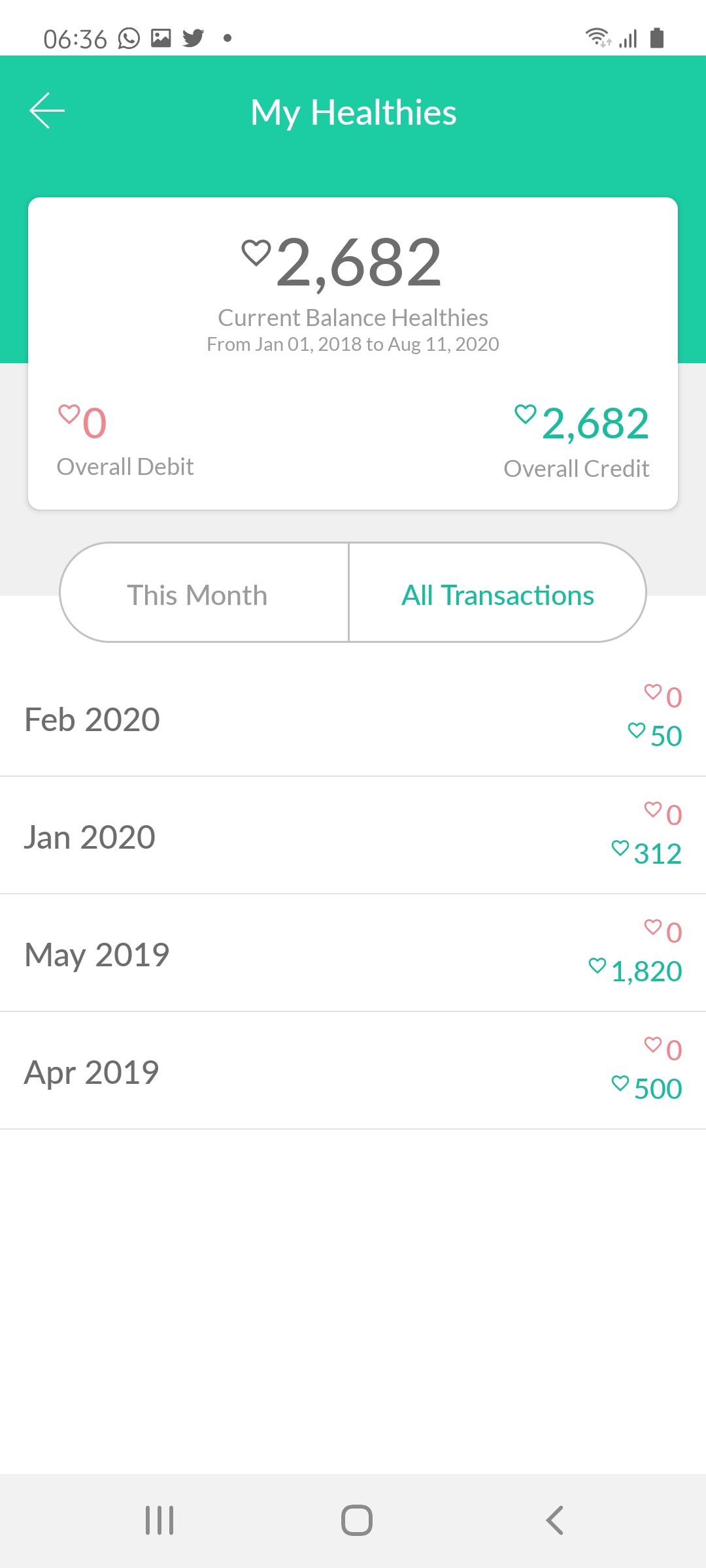
However, doctors are first asked to upload scanned copies of their Medical and Dental Council of Nigeria certificates and their bank account numbers before they are granted final approval.
After posing as a doctor, this reporter was granted access to use the app where he uncovered well-oil and sophisticated exploitation of Nigerians seeking medical help and an illegal reward system for doctors.
Apart from the standard 20 per cent kickback from the fee Me Cure charges the patients, they refer for diagnostic tests, doctors are ranked into “clubs” and rewarded accordingly on the app according to the number of referrals they make and their interactions on the app.
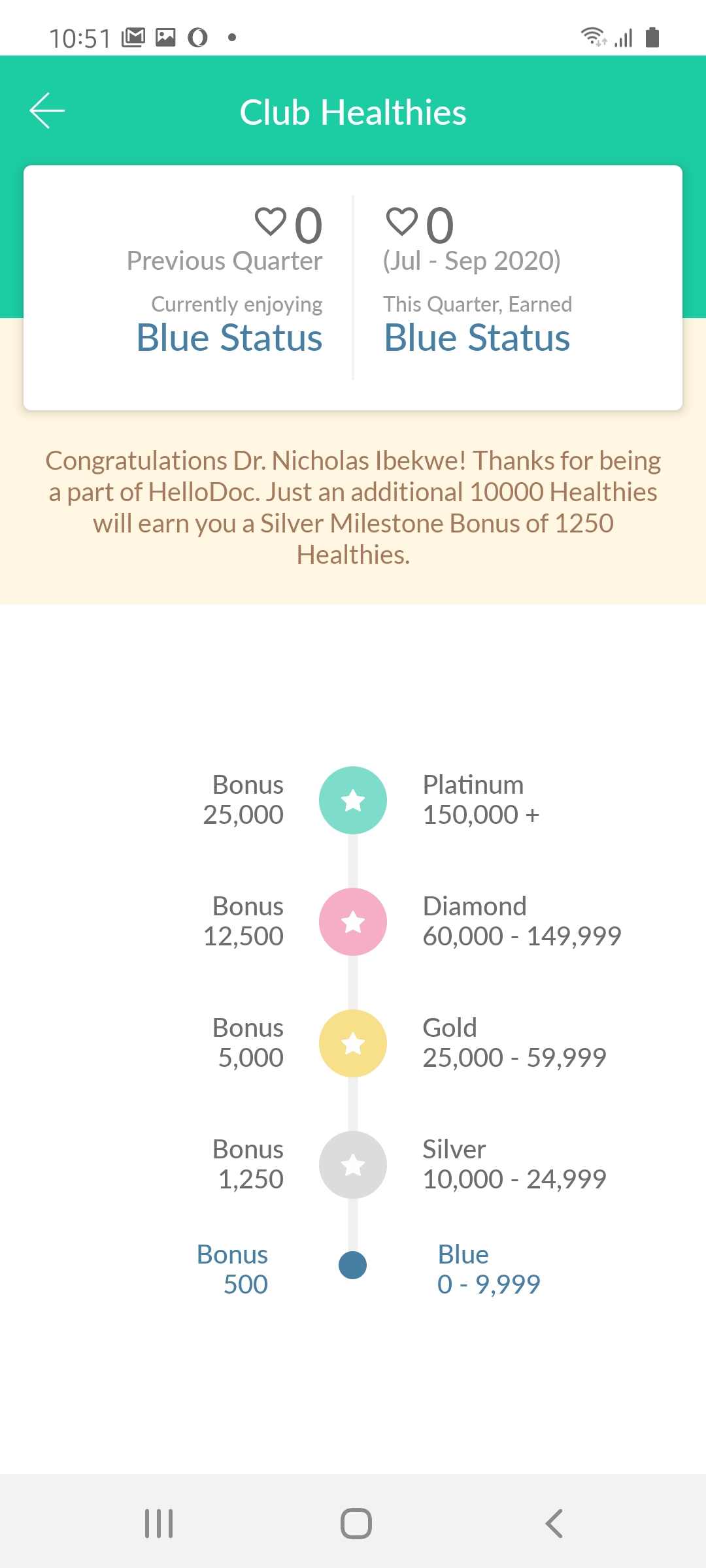
Doctors are ranked into Blue, Silver, Gold, Diamond or Platinum club. The entry club membership is Blue. The ranking is done through the use of loyalty tokens called “Healthies.” One healthies is equivalent to N1. Upon the verification of a doctor’s registration on the app, he is given a bonus of 500 healthies and given a Blue club membership. Then the doctor begins to gather healthies based on the number of referrals he makes to the laboratory (doctor are given 1,000 healthies for every referral) and other interactions such as participation in a weekly quiz competition or for merely logging into the app.
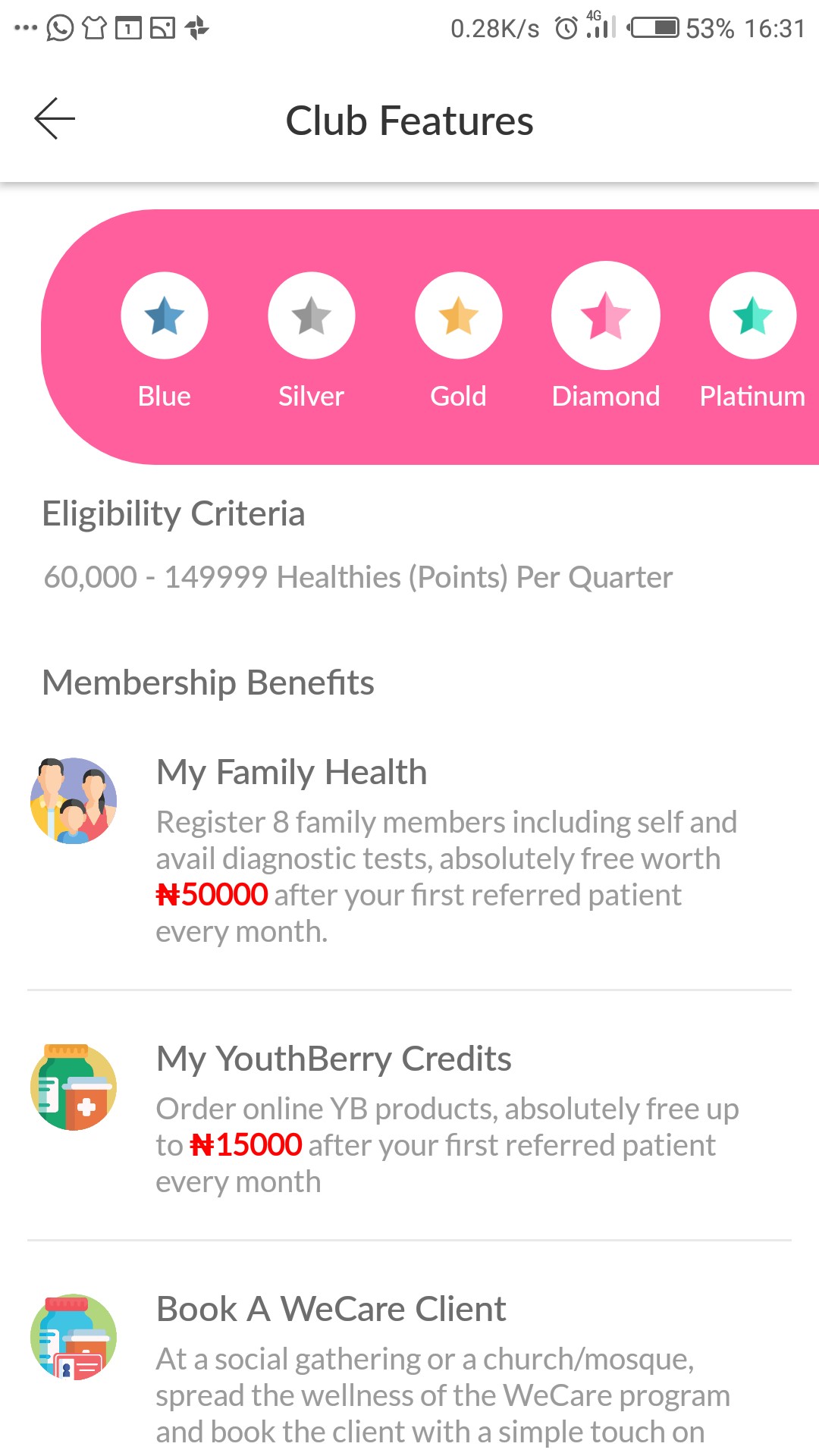
Earned Healthies are used to obtained items from telephone recharge cards, Uber rides, spa care, a discount of test done for family members of the referring doctors, attend international conferences, all-expense-paid vacation to exotic locations with members of their families and the cash equivalent of up to N25,000 can be transferred into doctors’ bank account at a time.
Doctors can also be assisted to get a car and home loans and microloans from N50,000 (Blue members) to N250, 000 (Platinum members).
Blue members are eligible to register eight family members including themselves for free diagnostic tests worth N10,000 for the first patient they refer every month, given N6,000 monthly worth of YouthBerry credit to other YouthBerry products – the company’s health supplement products. They can also use acquired healthies to plan for international conferences or book a vacation.
A doctor is elevated to the Silver category when he or she acquires between 10,000 and 25,000 healthies. A Silver member is eligible for a free diagnosis of up to N15,000 for themselves and up to eight members of their families for the first patient they refer every month, N10,000 monthly credit to buy YouthBerry products and attend international conferences and holidays.
To become a Gold member, doctors would have to acquire between 25,000 and 60,000 healthies. As benefits for that level of membership, they can conduct tests of up to N25,000 for themselves and eight family members free of charge for the first patient they refer every month, gifted N12,500 monthly to buy YouthBerry products, travel for conferences and vacation and be assisted by Me Cure to negotiate and guarantee them to secure home loans.
Diamond members are gifted N50,000 free for medical tests for themselves and eight members of their families for the first patient they refer every month, N15000 monthly to order YouthBerry products, become eligible for Me Cure’s Corporate Guarantee Home Loan and travel for international conferences and holidays. A doctor needs to earn between 60,000 and 150,000 healthies to be eligible for a Diamond Club membership.
A doctor that is ranked a Platinum member must have acquired over 150,000 healthies. For the first referral they make to Me Cure every month, doctors and eight members of their families are gifted N100,000 worth of free diagnostic tests and N20,000 worth of YouthBerry products monthly. They also become eligible for Me Cure’s Corporate Guarantee Home Loan, and travel for international conferences and holidays.
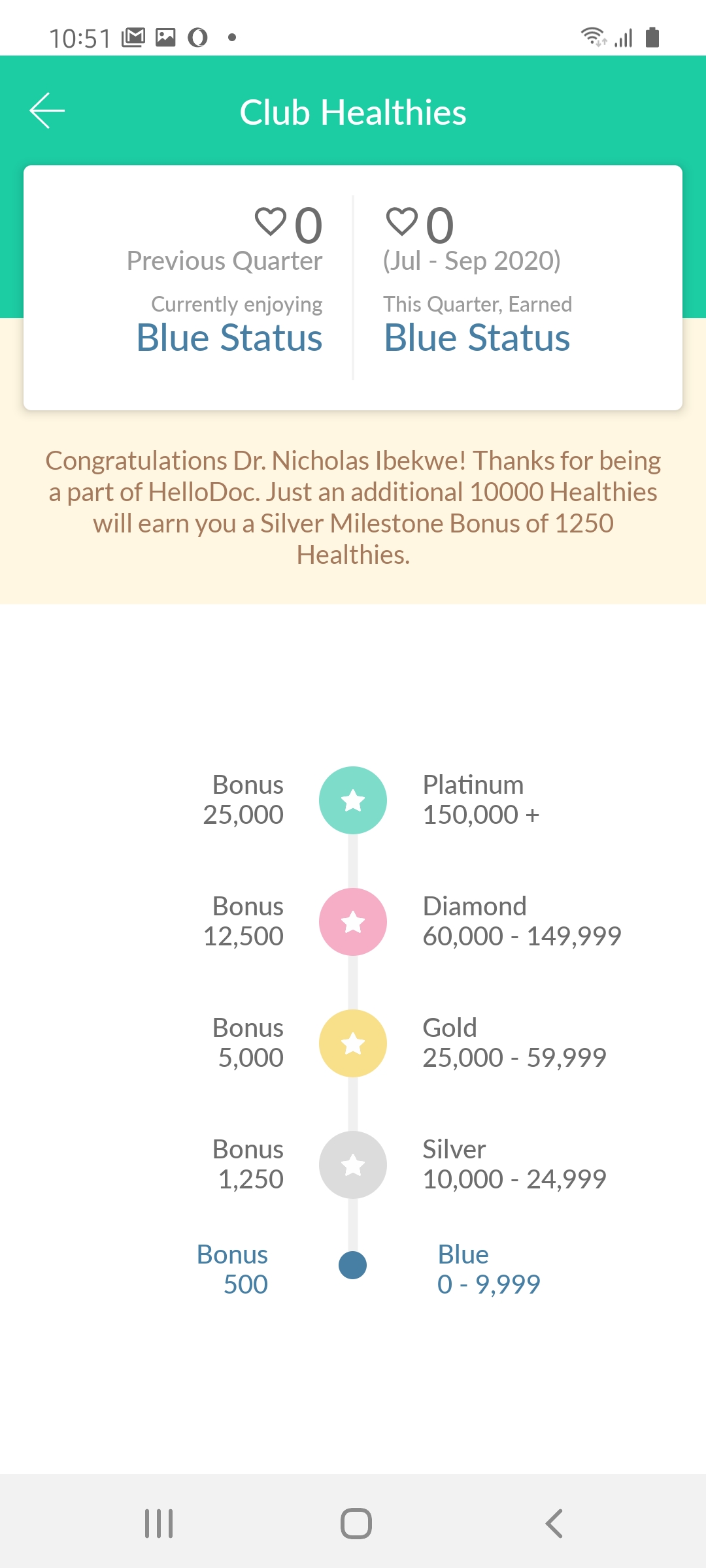
This PREMIUM TIMES reporter referred two people to conduct medical tests at Me Cure but only received a commission for one. An employee of the laboratory who chatted this report on the HelloDocApp claimed the record of the first test could not be verified and thus the first 20 per cent kickback due to this reporter (posing as a doctor) was not paid. The laboratory, however, verified the receipt for the second test we did and paid the 20 per cent rebate.
On January 27, Me Cure credited this reporter’s account number with N2,040.00, being 20 per cent of the second set of tests referred to the laboratory. The reporter was also credited with a total of 2,682 healthies on the HelloDoc app.
Me Cure did not respond to an email sent to them requesting for comments on their partnerships with doctors. When this reporter called the laboratory’s number, a customer service representative who answered the call said all enquiries to the company should be sent to the email address this reporter originally sent his enquiries to. She then added, “if they want to respond to you, they will do so via that email.”
Echolab and its referrals MOUs
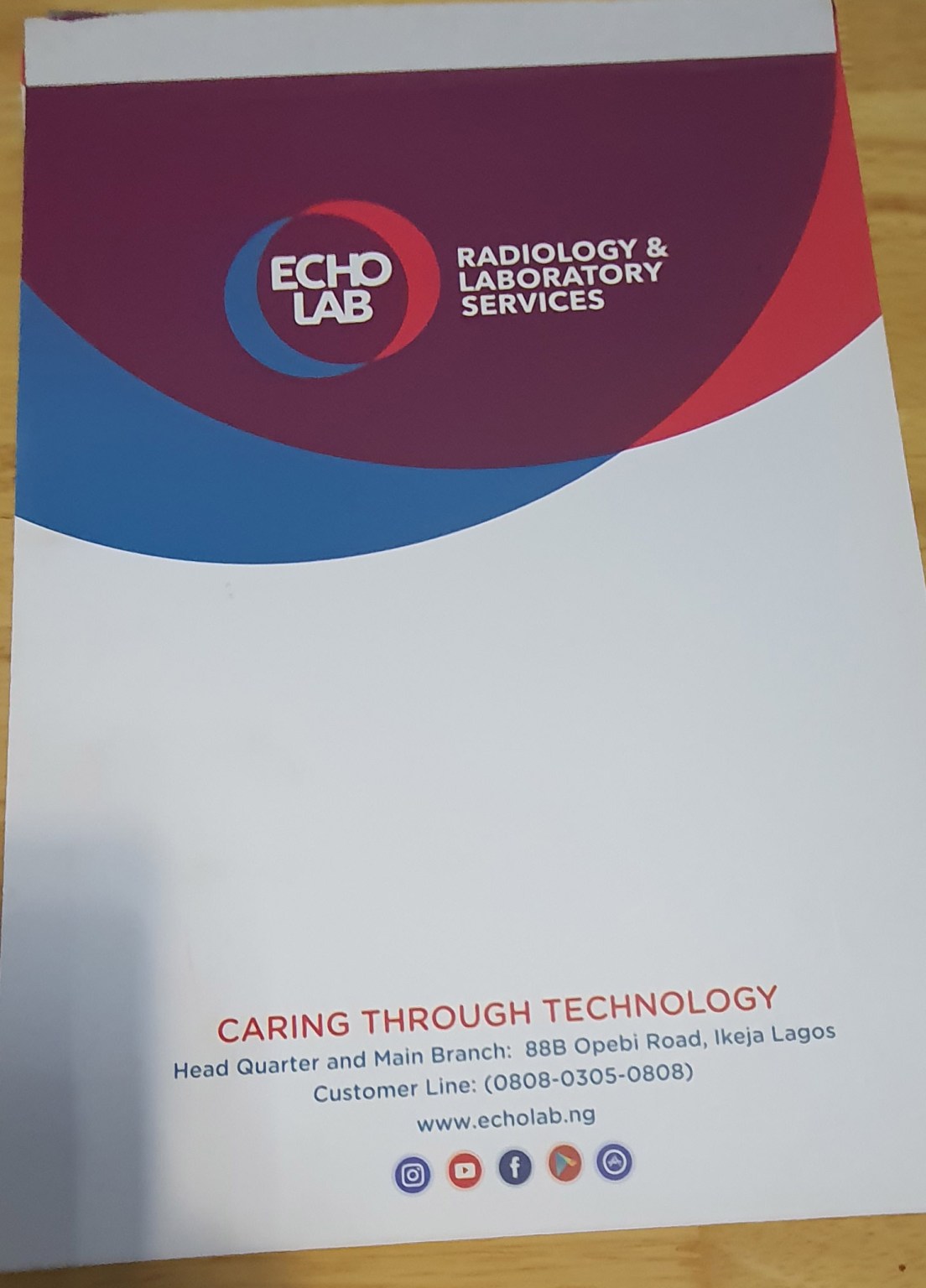
Echolab has been in the medical diagnostic business in Nigeria for over 20 years under its former name Echo-Scan. Last year the laboratory got a boost and a change of name after Egyptian diagnostics behemoth, Integrated Diagnostic Holdings (IDH), invested $25 million in the business in December 2017 and became the majority owner.
IDH is a leading medical laboratory provider in the Middle East with over 452 branches in Egypt, Jordan, Sudan, and now Nigeria.
With 13 branches across six states in the country, Echolab has perhaps the largest medical laboratory network in the country.
Echolab makes doctors and hospital sign a “Memorandum of Understanding and Service Agreement”, where the kickbacks are referred to as “hourly rates”, and purportedly perform services such as “Evaluate the quality of diagnostic services provided by the company’s diagnostic centre to the physician’s patients including the quality of the test performed by the company’s diagnostic centre and the accuracy of the results relating to the assessment of the level and quality of result of the analysis of his/her patients by the company’s diagnostic centre and the overall level of service provided to the patients.”
The agreement also stated that doctors are being paid an hourly rate for communicating with representatives of the diagnostic centre as well as discussing his responses to periodic questionnaires that will be provided to them.
“The physician fees shall be determined based on the actual number of hours spent by the physician in providing services,” the MoU stated.
“This whole exercise culminates into a research programme generated towards overall patient care,” the MoU further said.
This reporter did not provide any of the services stated in the MoU neither was he asked to. He was also not told what the so-called “hourly rate” was going to be. The sales representative of the company, Bukola Daniel-Arigbede, who handled this reporter’s registration, also did not inform this reporter of the number of hours he must put in.
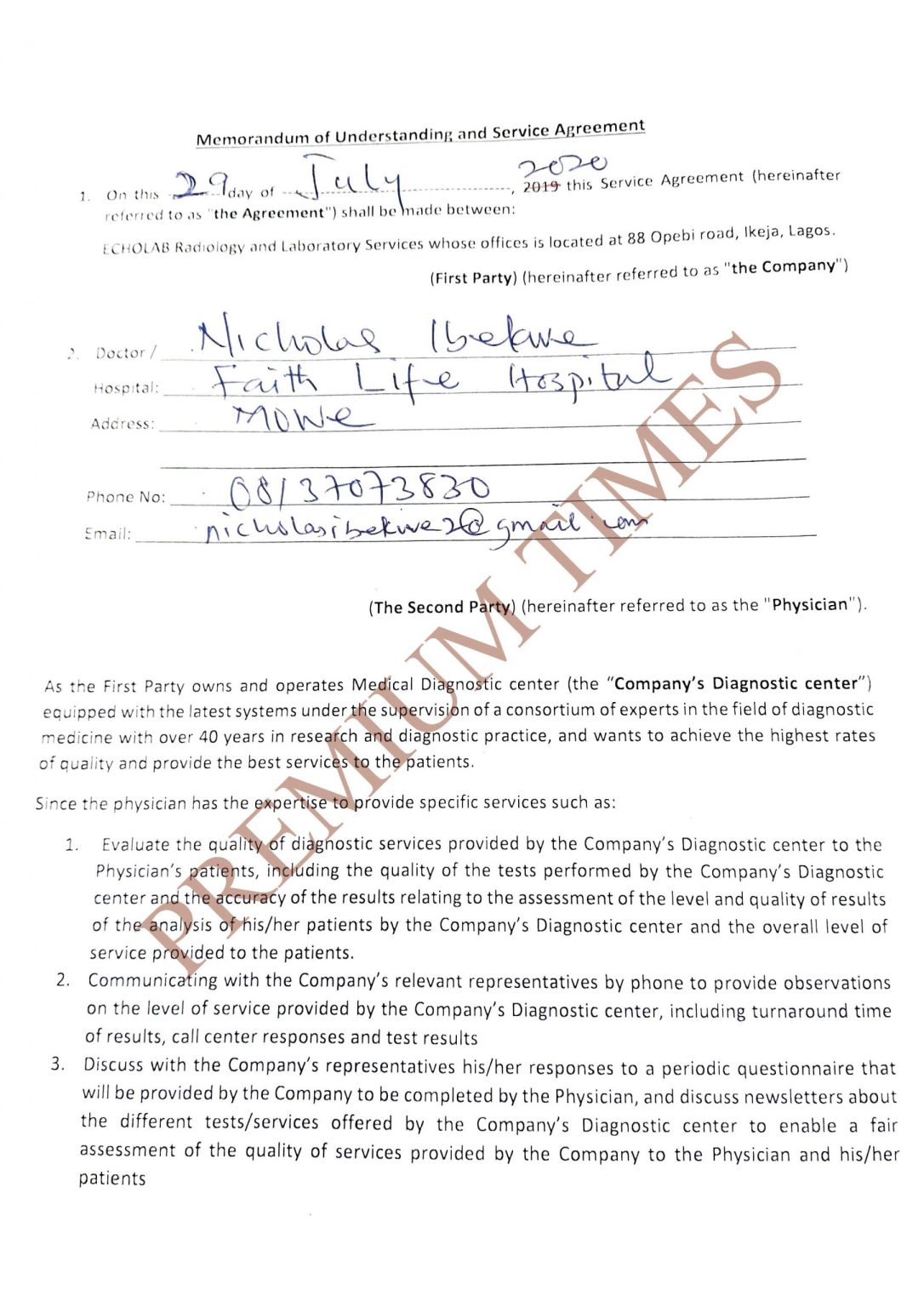
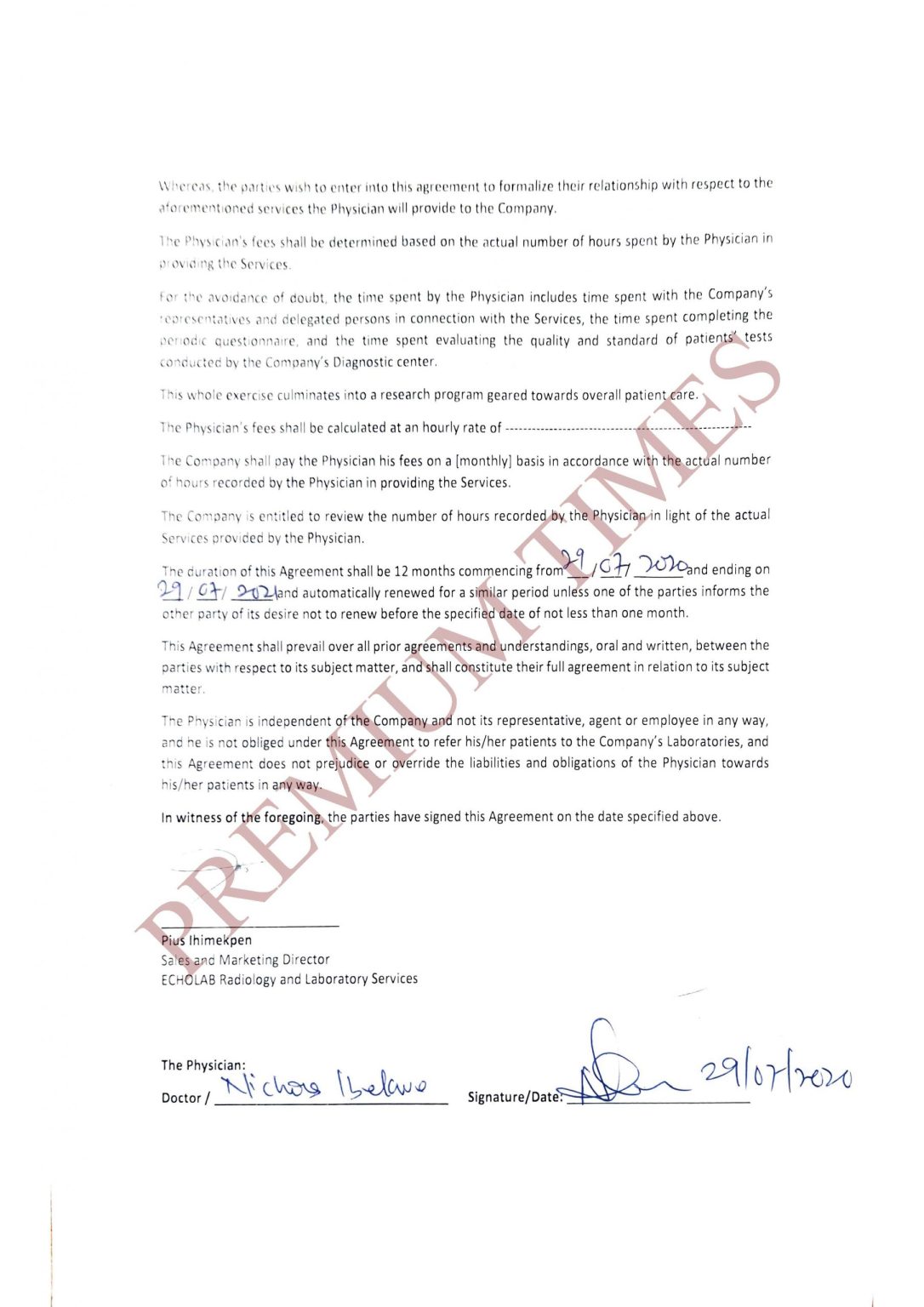
This reporter was only credited with 20 per cent of the cost of the medical test done by the person he referred.
When this reporter, posing as a doctor, tried to register with Echolab and send someone for a routine test during the last Eid-el-Kabir holiday, Daniel- Arigbede explained that entire kickback operation is run from Egypt by IDH.
“The registration is done by our parent company based in Cairo,” she said. “They actually control everything we do. If not for the holiday, it is a thing that will be done immediately. We send the name to them. It is just a mail away. But, because of their closure for the holiday, you know they are basically Muslim country, they will be closed for the period of the holiday.”
When this reporter insisted that he wanted his 20 per cent cut paid immediately and could not wait until after the holiday, Daniel-Arigbede came up with a solution.
“If the patient can come, I will appreciate if you can give me a list of the test the patient will be running, what I will just do is log the patient under another client of mine that has a 20 per cent discount and it is a cash account, so that once we logged the patient under we would be able to get your 20 per cent sent to you immediately, not till the end of the month.
“I can do a bank transfer from my own personal account because I am the one managing your account,” she said.
However, Daniel-Arigbede said she was only opting to pay this reporter from her own account because of this reporter’s insistence on being paid immediately. She explained that the normal practice was for the company to pay the kickback to the referring doctors directly.
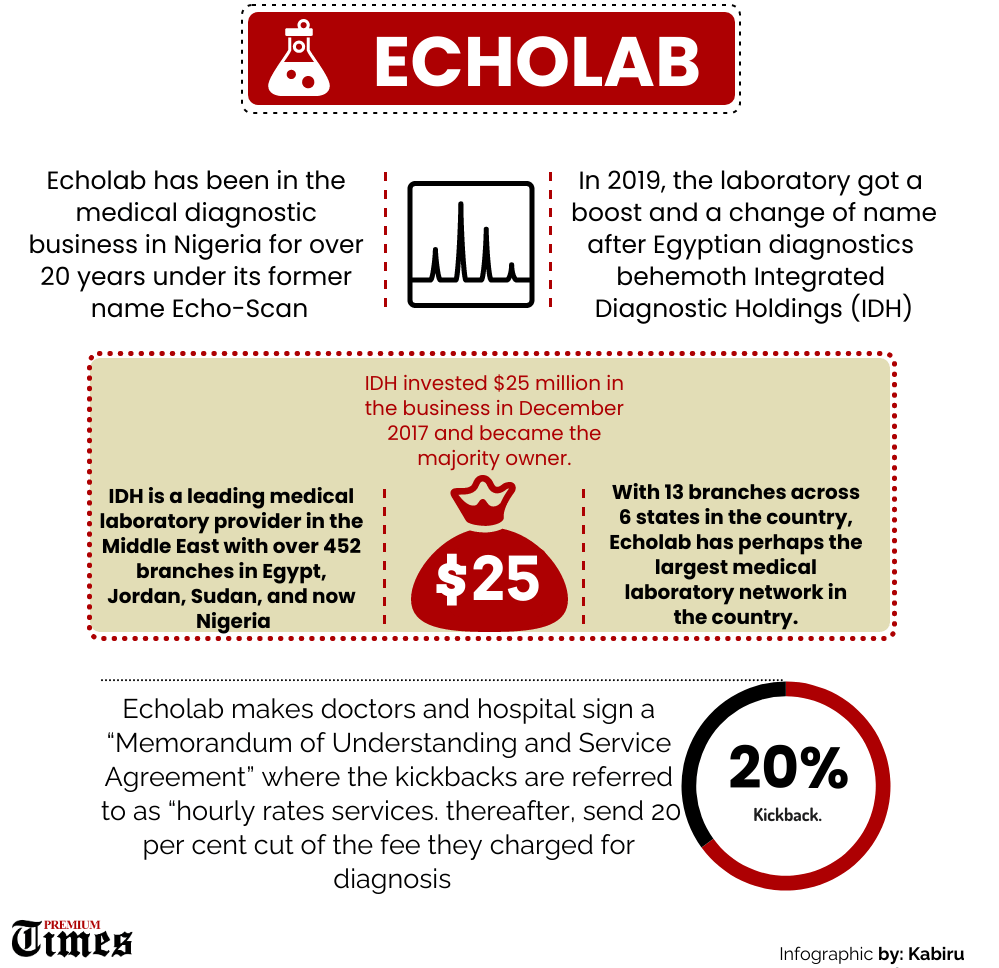
“Actually, the company pays directly to everybody’s account,” she said. “We do not pay with staff accounts. With the situation on the ground, the patient will be coming in tomorrow and we have not yet set you up. We will give your patient the normal price, I will now log in the patient under a 20 per cent discount account (that is operated by) another hospital, but they don’t receive rebate. The amount is already discounted for them automatically. The hospital pays us less 20 per cent,” she said.
“I also have a credit account whereby we sent bills to them at the end of the month less 20 per cent. We don’t pay cash account at the end of the month. They pay us themselves. The patient pays to them at the hospital and sometimes they even top up the bills that they give to the patients, but they pay us less 20 per cent.”
She credited this reporter’s account with N2,600.00 on August 3, which is a 20 per cent cut of the cost of the test conducted.
Echolab did not respond to an email requesting it to comment for this report.
Afriglobal
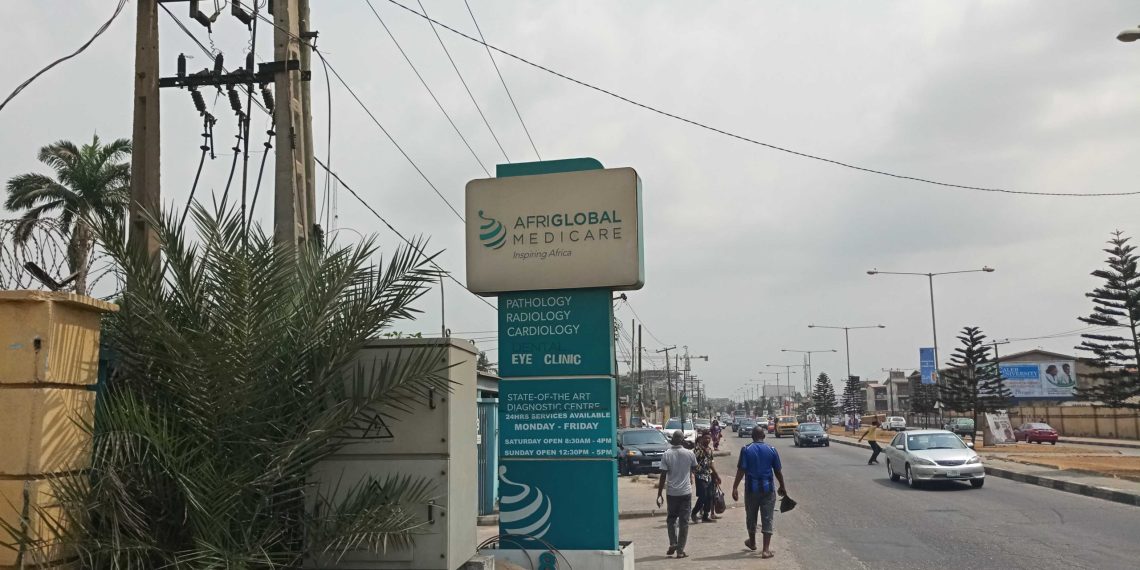
Afriglobal Medicare is owned by Dubai-based Afriglobal Group, which has interests in chemicals distribution, logistics and healthcare industries. The group has operations in Nigeria, Cameroun, Ghana, Djibouti, Ethiopia, Tanzania, Egypt, India, China and South Korea.
Afriglobal Medicare has offices in Lagos, Abuja, Kano, Aba, and Onitsha. When contacted, the company’s salesperson, Kayode, eagerly handed this reporter three booklets of referral forms at a mall in Ikeja. Again, no attempt was made to verify if this reporter was a doctor or qualified to refer a patient for diagnostic tests. After PREMIUM TIMES sent someone to do a set of routine medical tests at the laboratory, the company credited this reporter’s account with N2,900.00 which was the 20 per cent of the cost of the test conducted. The money was paid on February 28.
When this reporter visited Afriglobal’s headquarter at Ikeja, an employee of the company who identified herself as Lanre (she said it was not necessary to say her last name) directed him to forward his question to the company’s official email address. Afriglobal did not respond to an email sent afterwards requesting comments.
VCare Diagnostics
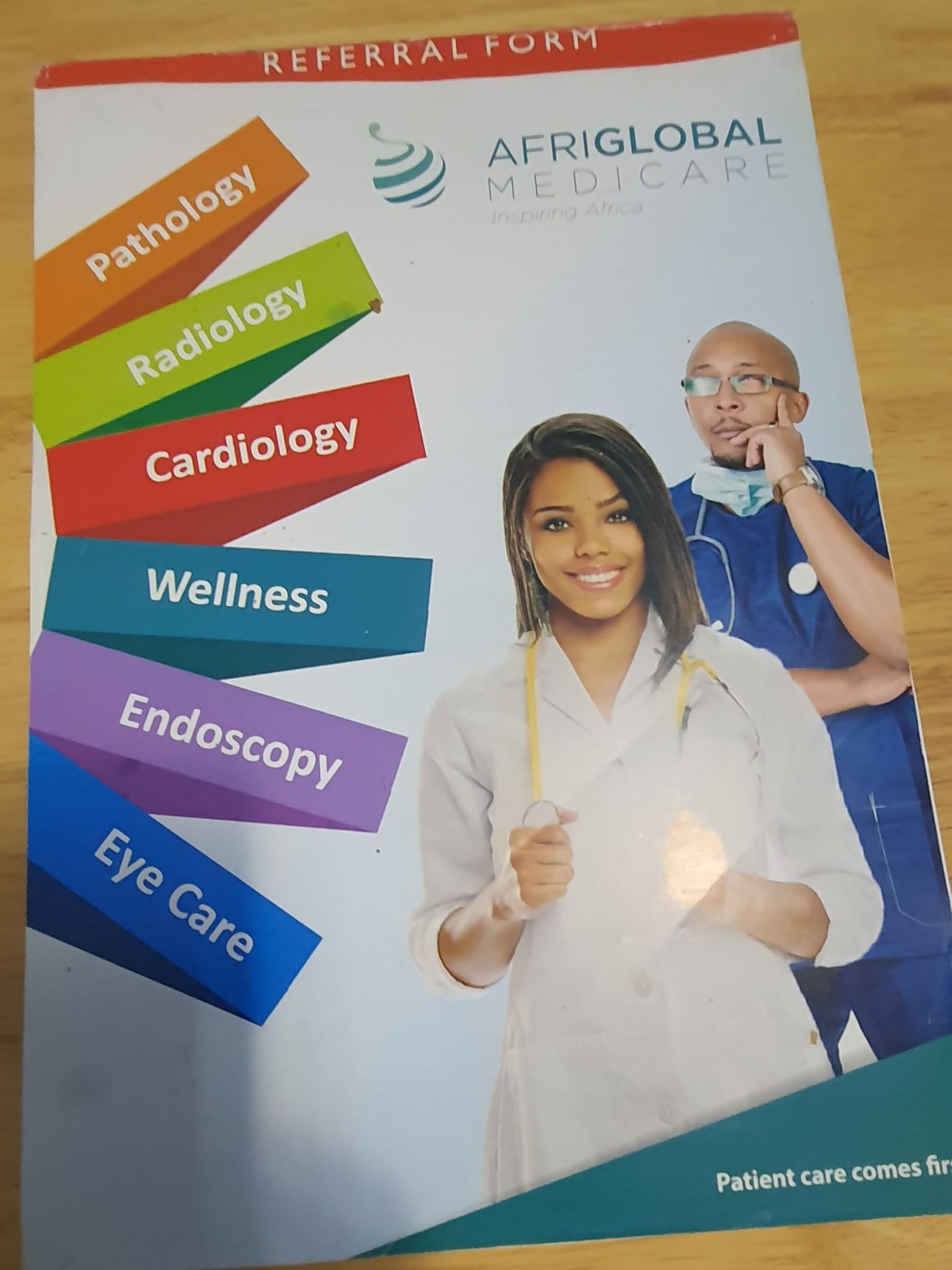
Vcare Diagnostics made this reporter sign an MoU. Kayode Ogunmakin, the company sales representative met with this reporter more than two times at a mall where he handed a booklet of the laboratory’s referral forms and made this reporter sign an MoU. Mr Ogunmakin also agreed to pay a kickback of 20 per cent for each test referred by this (doctor) reporter. He made no attempt to verify if this reporter was a physician as he claimed.
Section 4 of the MoU titled “Pricing” expressly stated that representatives of the laboratory are to discuss what the laboratory referred to as “B2B prices”, a thinly veiled term for paying back the hospital or doctor a cut and commission for tests referred to the lab, an arrangement which is prohibited by Sections, 36 and 65 of the Code of Medical Ethics of Nigeria.
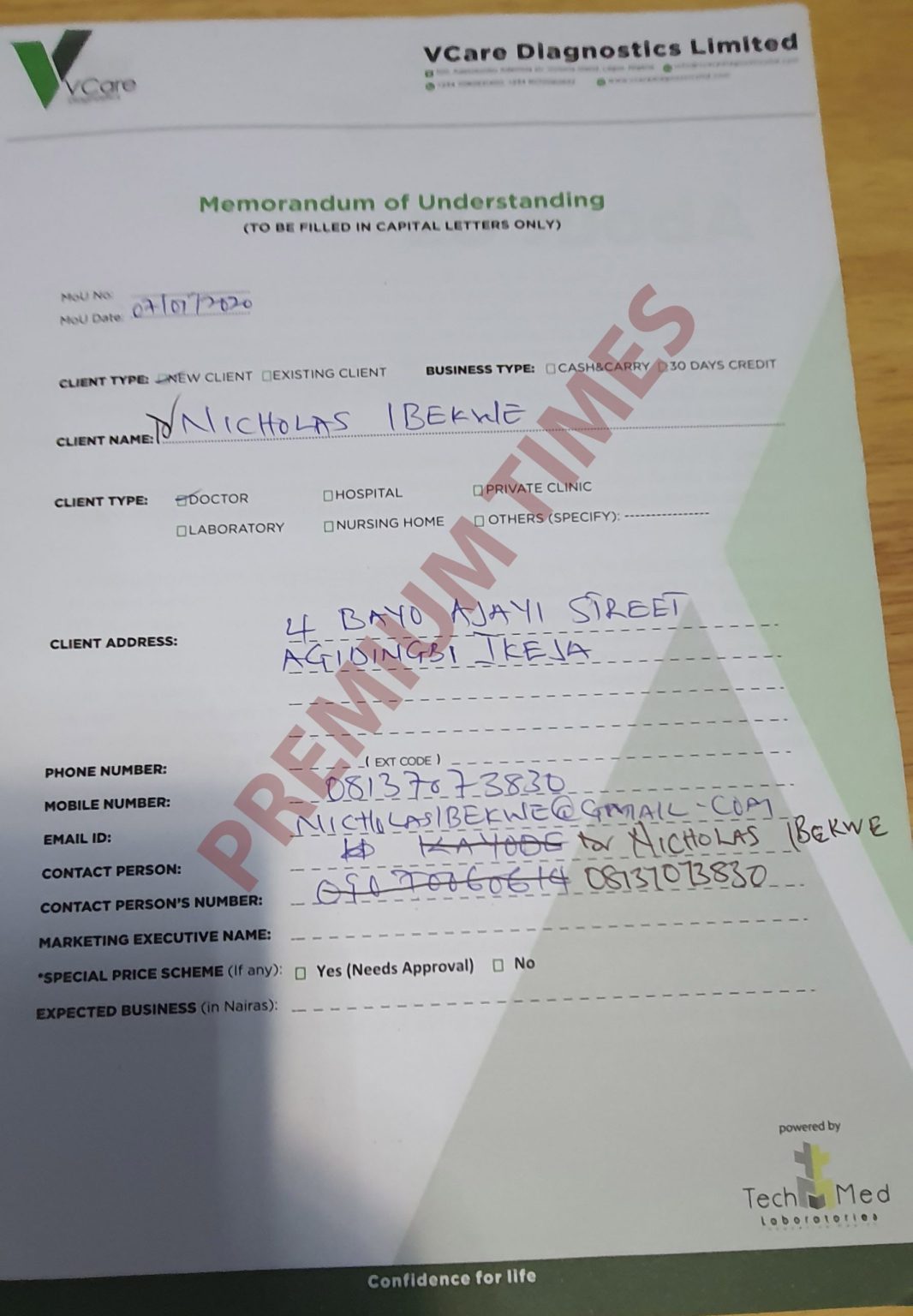
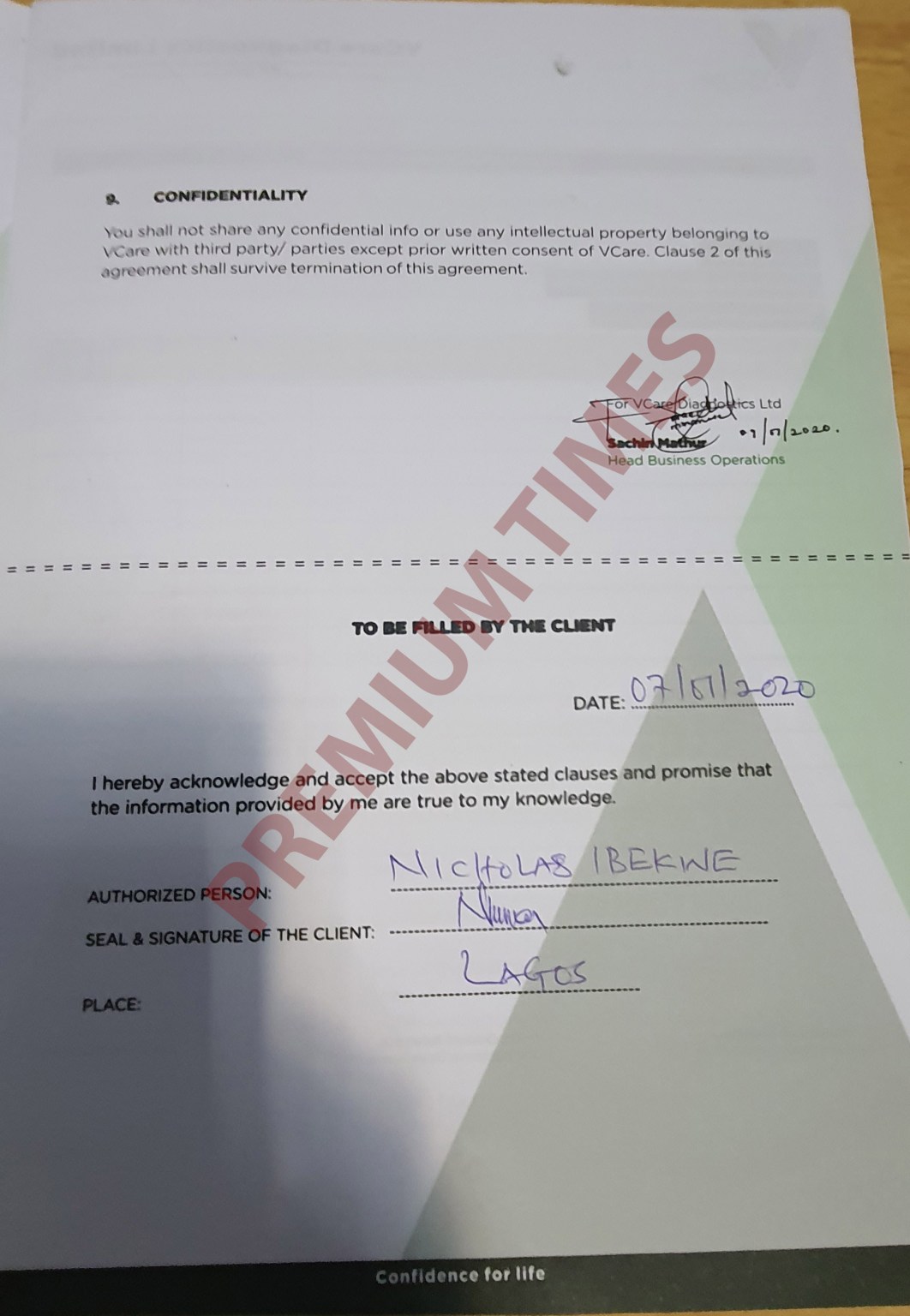
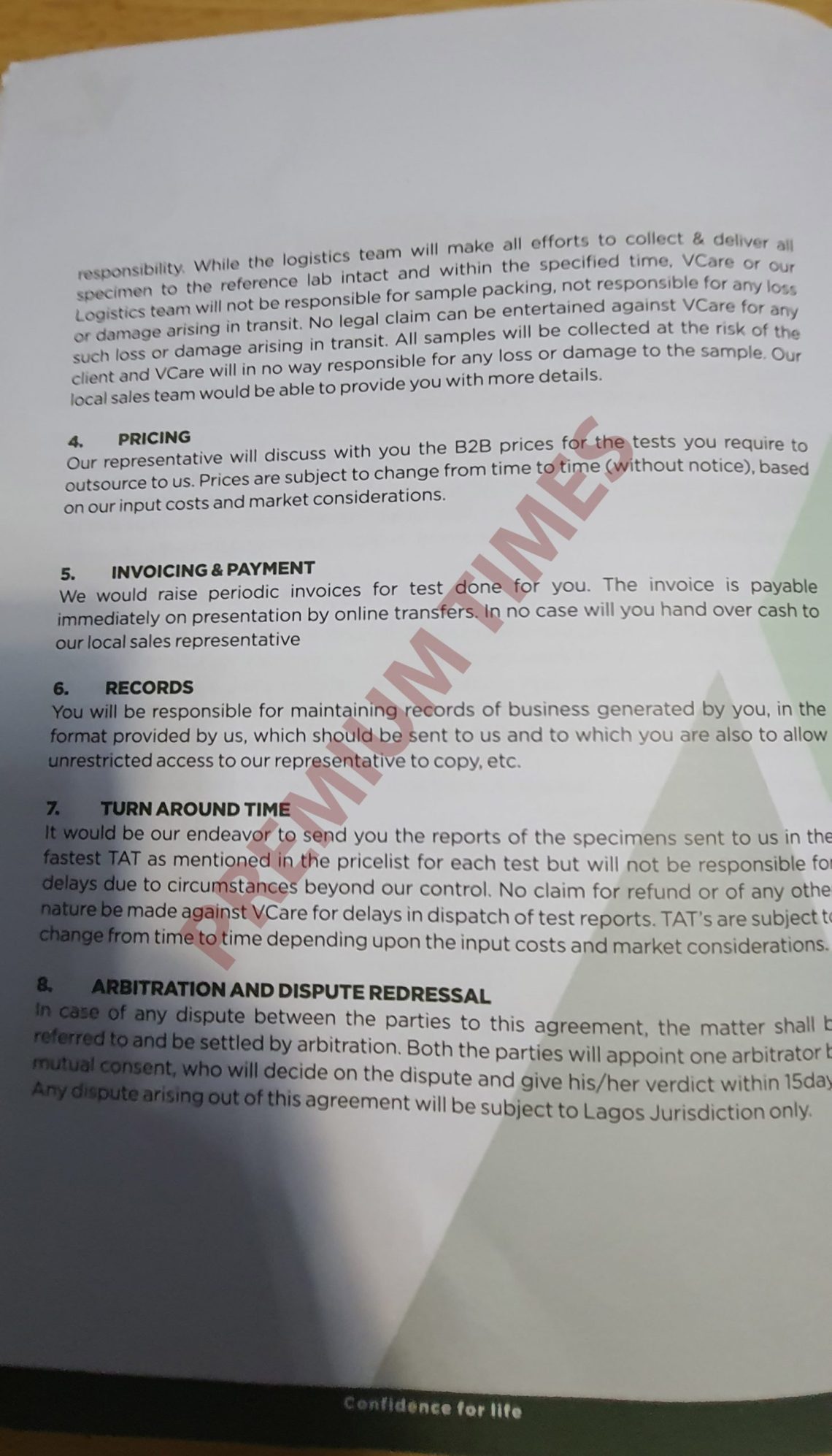
“Our representative will discuss with you the B2B prices for the test you require to outsource to us. Prices are subject to change from time to time (without notice), based on our input and market considerations,” the section reads.
But VCare signed the MoU with this reporter as an individual and not as a registered business providing services worthy of a commission.
However, after the tests were conducted, Ogunmakin became shifty giving this reporter a series of excuses for not paying the agreed cut. He said the company was having financial challenges, that they were still trying to break into the market having started business less than two years ago.
In fact, he said his salary for April was delayed as a result of the financial challenges the laboratory was facing. When this reporter asked for the rebate two weeks later, he said the company’s account team said it has been paid. That was not true. This reporter’s account was never credited with the agreed 20 per cent cut.
When reached for comment, contrary to Section 4 of the MoU it made this reporter sign, VCare denied that it pays doctors or hospitals a cut of the cost of medical diagnosis referred to it.
A.O. Olufisayo, general counsel to VCare Diagnostics Limited, described PREMIUM TIMES findings as “unfounded and baseless”.
“We take exception to the baseless and unfounded allegations contained in your email against the Company,” he said in an email to PREMIUM TIMES. “VCare is a laboratory equipped to international standards and a strategically positioned player in the industry. The company values excellence and integrity.
“We categorically state that all the allegations contained in your emails are false and have no merit whatsoever. VCare does not pay, neither does it condone the payment of rebates or kickbacks of any sort nor is it involved in the extortion of customers. The welfare of its Clients is the Company’s utmost concern.
“We hope this sufficiently clarifies our position. Be guided.”
Vedic Lifecare Hospital
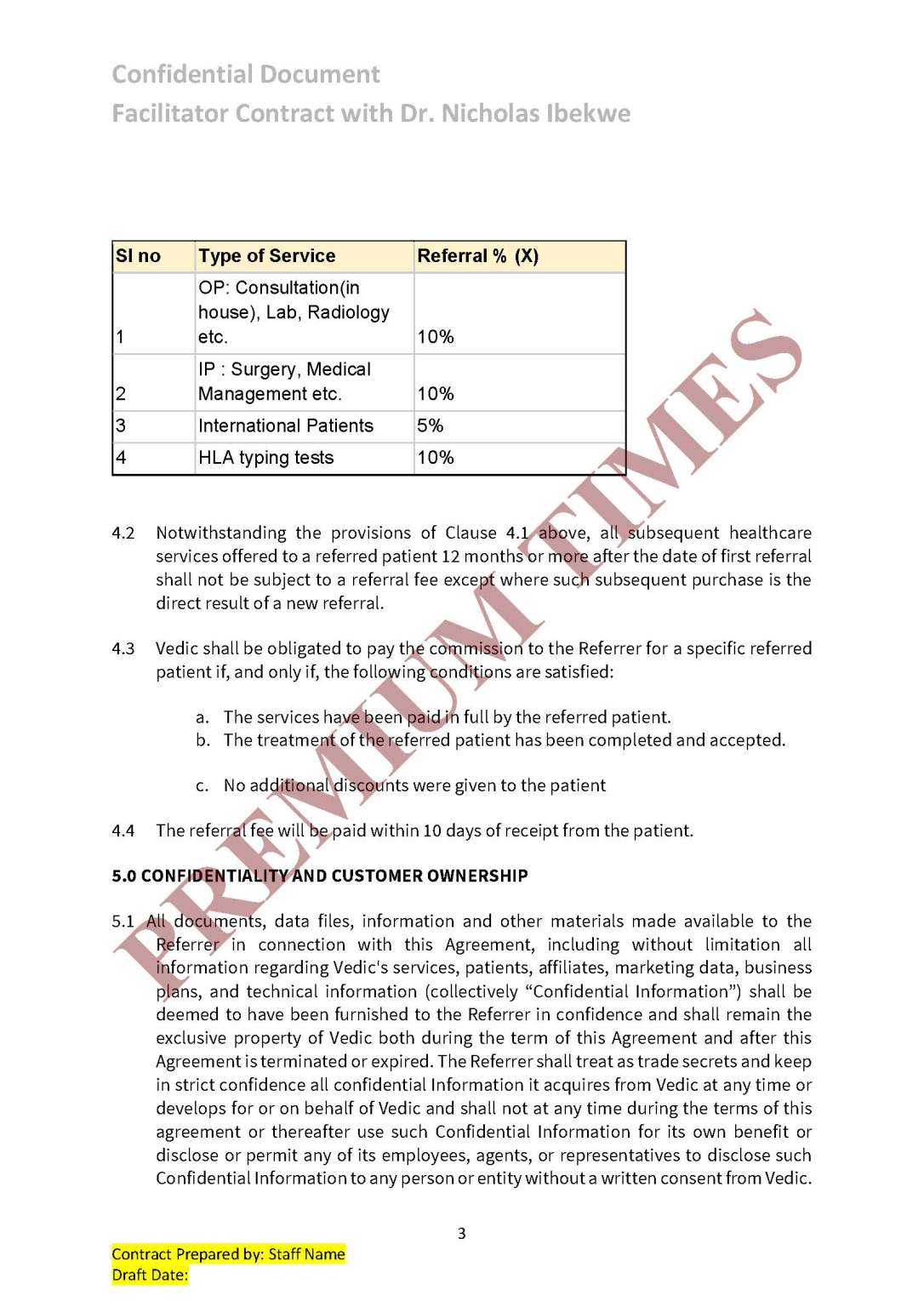
Vedic Lifecare Hospital is a multispecialty hospital in highbrow Lekki, Lagos. The hospital was set up in collaboration with Manipal Hospital, which is rated by Newsweek Magazine as the 18th biggest hospital in India in 2020. Manipal Hospital provides technological and management support to Vedic Lifecare Hospital.
The hospital, which claimed its mission is “bringing world-care healthcare standard within the reach of every individual at an affordable cost”, openly expressed willingness to pay a cut of the cost of the medical tests and other services referred to it.
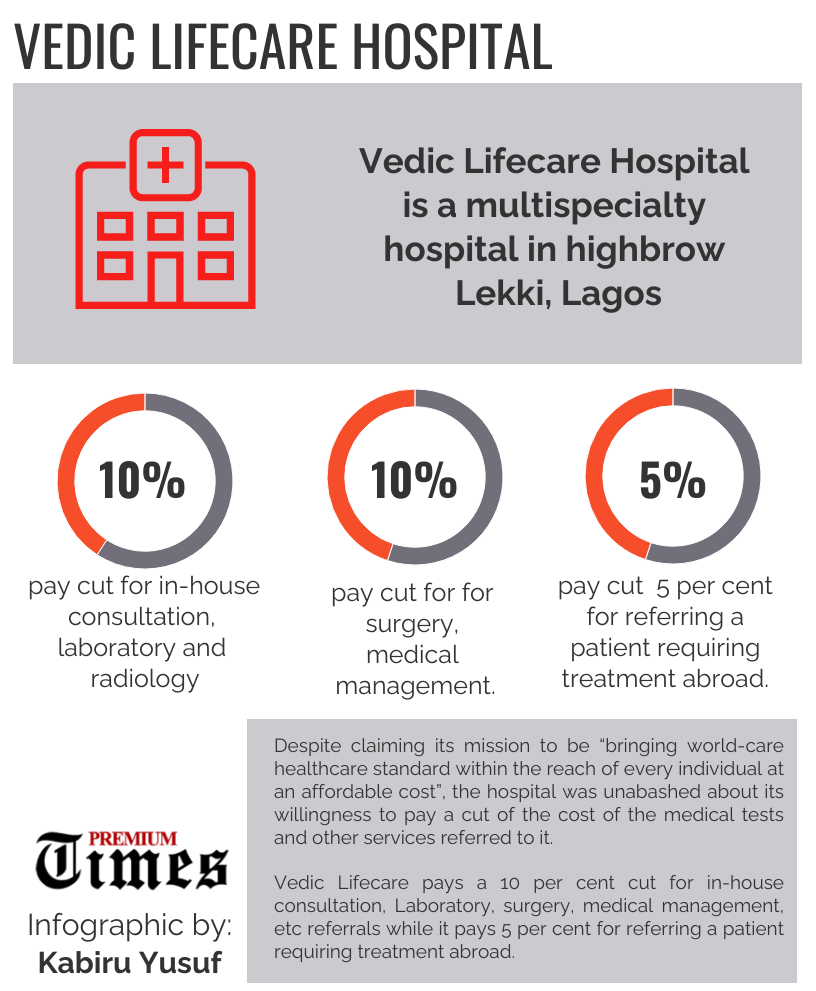
Although the hospital describes itself as a place where “medical ethics prevails” it had no scruple making this reporter sign a “referral contract” which agreed to pay 10 per cent kickback for every in-house consultation, laboratory and radiology referral made to it.
Similarly, Vedic Lifecare pays a 10 per cent cut for surgery, medical management, etc referrals while it pays five per cent for referring a patient requiring treatment abroad.
According to the contract, the referrer is expected to “use reasonable efforts to endorse and promote Vedic and its services, as well as to refer and forward prospective patients to the services and facilities offered by Vedic…”
The referrer is also expected to “formally introduce Vedic to each new referral. Such an introduction may be by telephone conference call and/or by an in-person meeting.”
“So long as this Agreement is in effect, the Referrer shall receive from Vedic a referral fee for each patient referred,” the contract says.
On January 31, Vedic credited this reporter with N1,840.00 being the agreed 10 per cent of the value of a set of medical tests this reporter, posing as a doctor, referred to the hospital.
PREMIUM TIMES later sent an email to Vedic to comment on its unethical practices. The company neither responded nor acknowledged the email. Later this reporter followed up with a call to the hospital. Amara, an employee, who answered the telephone confirmed that email was received and promised to forward it to her boss. Vedic Lifecare Hospital is still yet to respond to our enquiries.
Clinix Healthcare
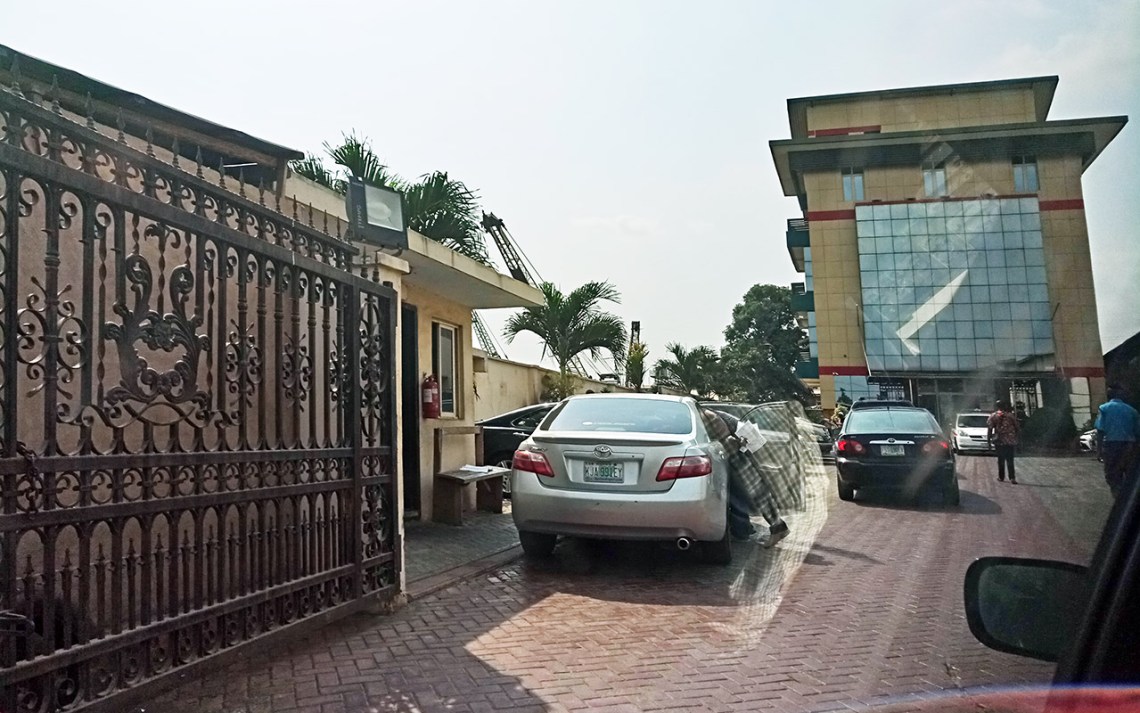
Medical practitioners who asked not to be named for fear of being blacklisted by their colleagues for exposing what they described as a “deeply entrenched culture” of kickback, especially named Indian-owned Clinix as one of the main perpetrators of the cut system.
When approached in early 2019, Tolulope Adeniyi, a marketing manager at the laboratory confirms that the company pays a flat rate of 20 per cent kickback for every referral made to the Gbagada-based laboratory.
However, the company did not pay the cut for the first set of tests done in 2019. The laboratory failed to credit this reporter’s account with the promised kickback despite demanding his account number. Adeniyi later said the cut was not paid because this reporter’s name was not properly registered as a referring doctor by the laboratory. He further explained that Clinix Healthcare only pays kickbacks within three months after tests are done.
After reporter ensured that he was registered, another set of tests was done at the laboratory on 24 January. Before then Adeniyi had introduced this reporter to the marketer in charge of the Ikeja Area, Happiness Udufo.
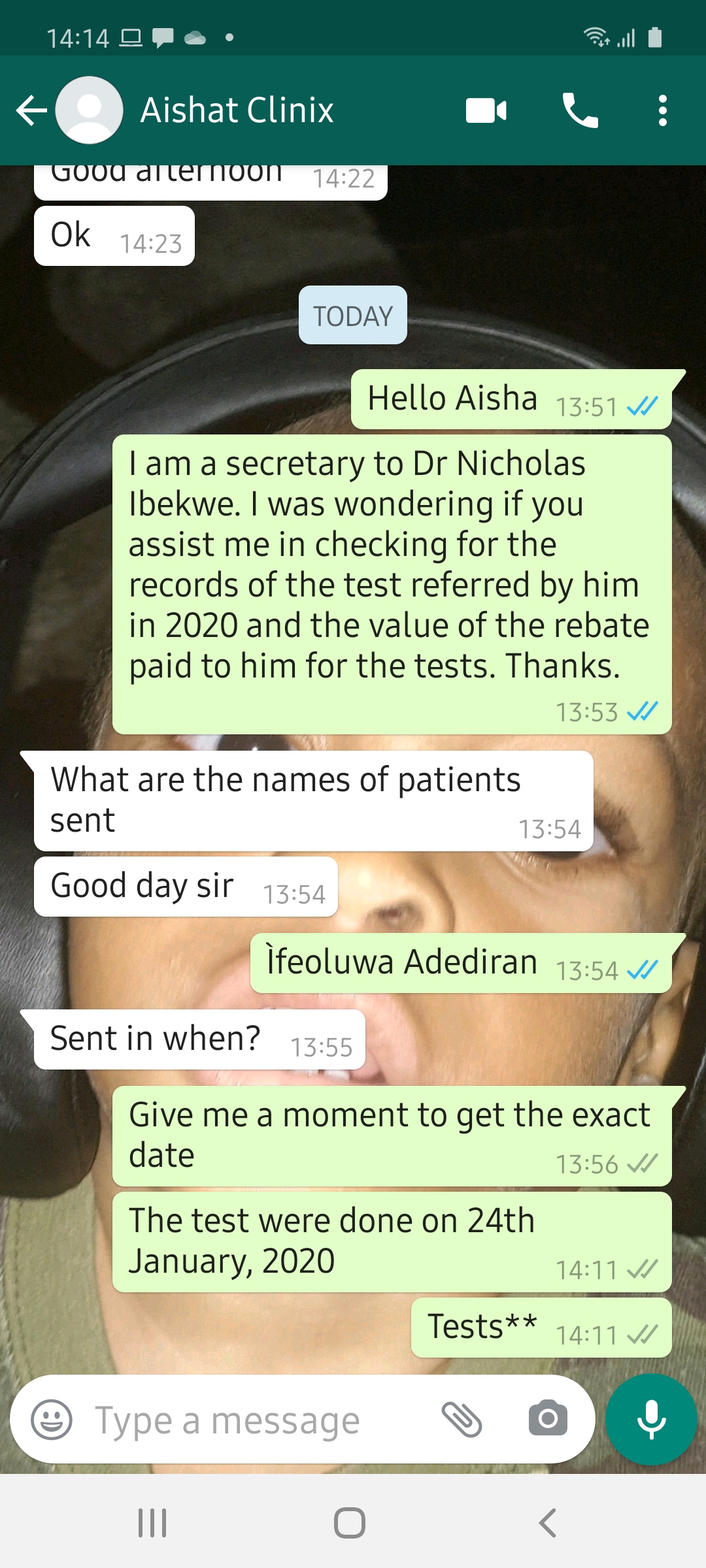
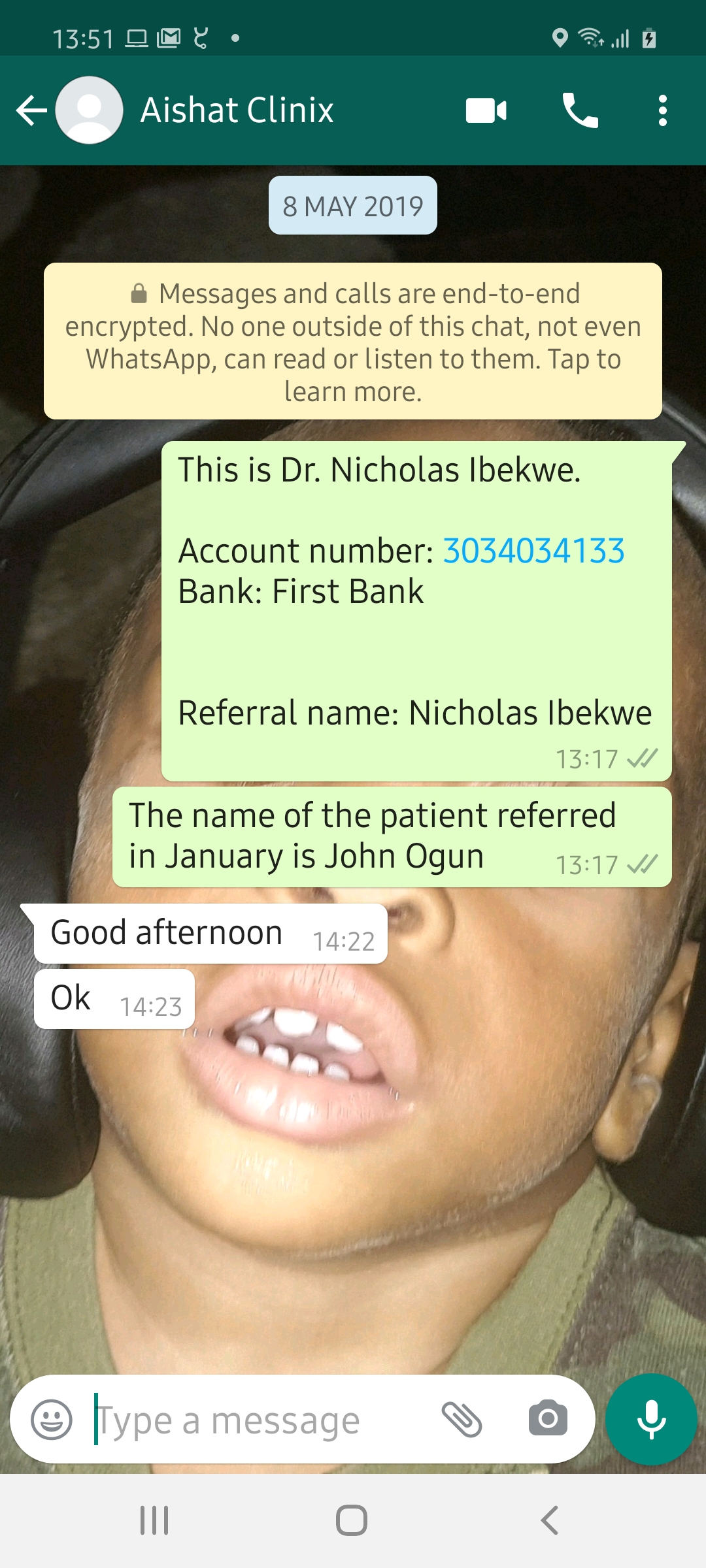
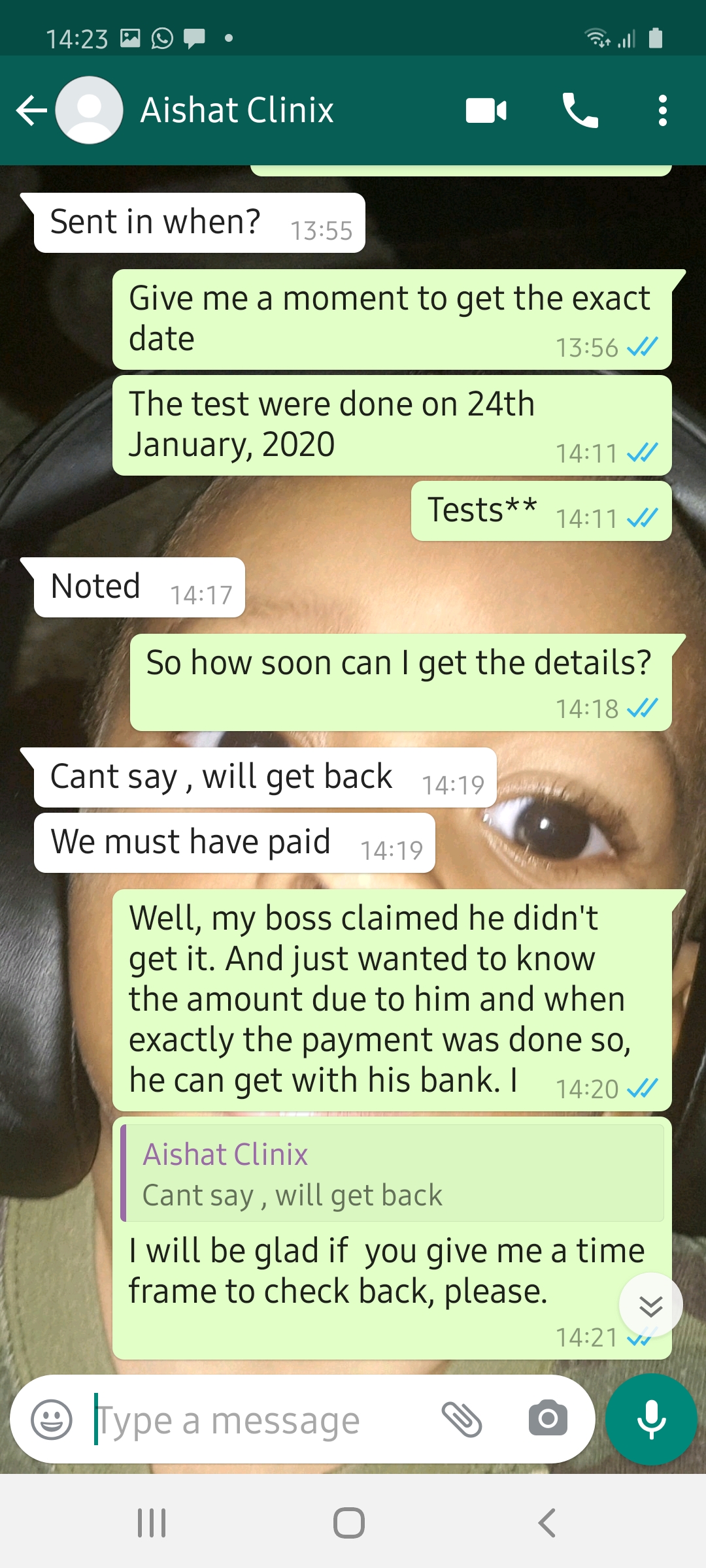
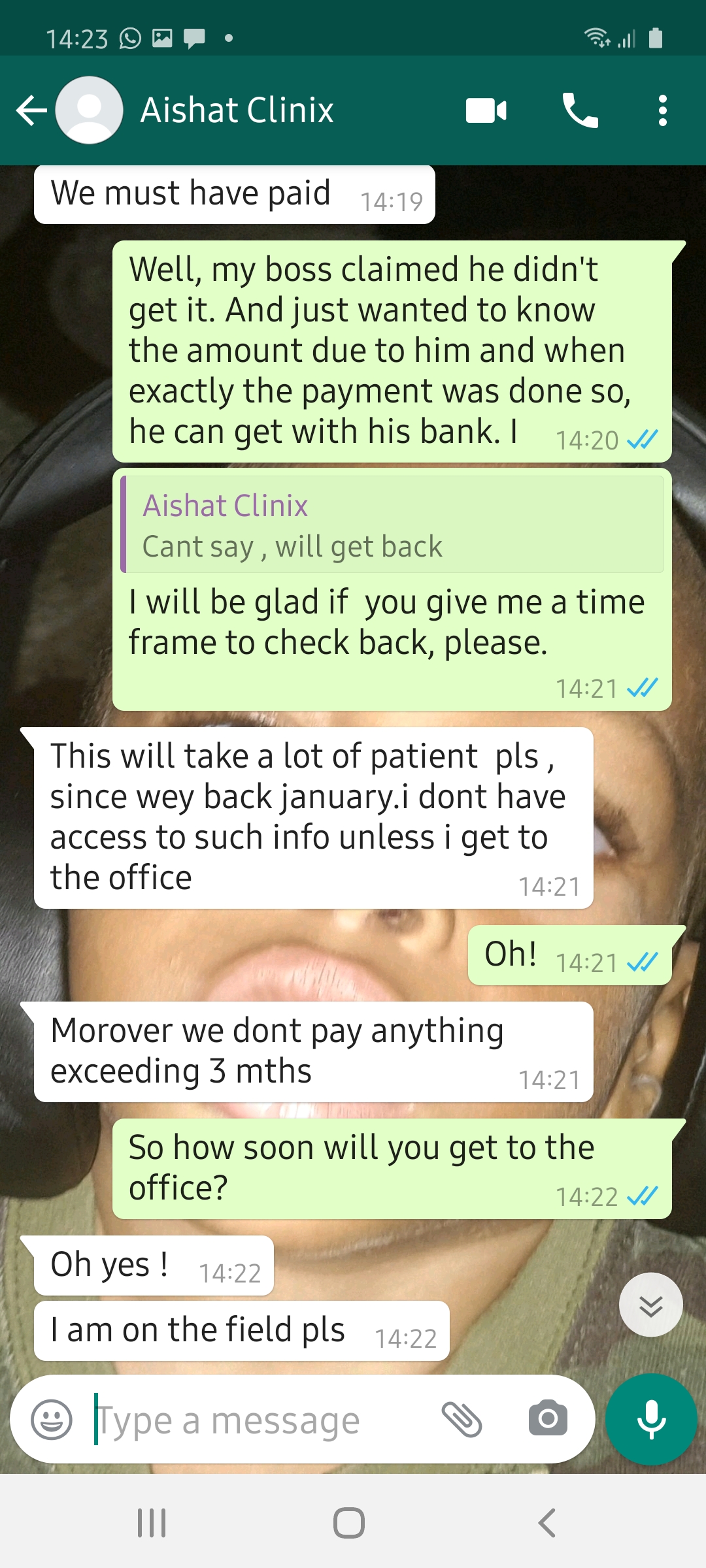
After the tests were done, Udufo promised that the kickback would be paid in the first week of March. He even shared a redacted register showing the value of the kickback to be paid to this reporter and the bank charges to be deducted. But again, Clinix did not credit the bank account of this reporter.
This reporter later followed up with the company on the promised kickback. Aishat, another employee of the firm, repeated the company’s policy of paying kickbacks within three months of tests. She insisted the cut must have been paid. But this reporter is yet to receive the payment.
Clinix Healthcare did not respond to an email requesting comments for this investigation. This reporter followed up with a call to the laboratory. An employee of the laboratory confirmed that the email had been received and promised to forward it to management. The laboratory is yet to respond to the enquiry.
Union Diagnostics
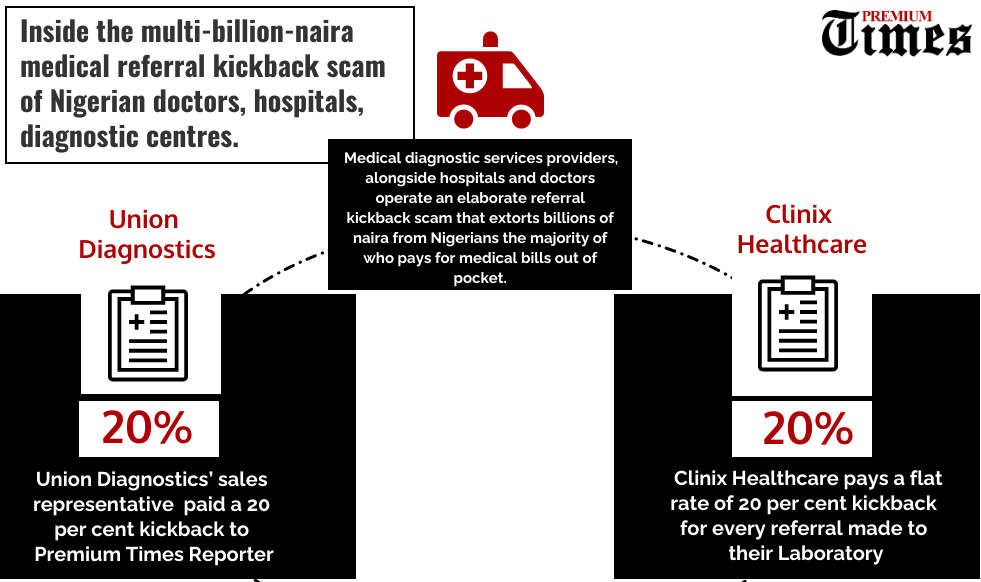
Union Diagnostics is an indigenous medical diagnostic company. It is the first Nigerian diagnostic company to be listed on the Nigerian Stock Exchange.
The company has 20 branches in 13 states including Federal Capital Territory, Abuja.
Union Diagnostics’ sales representative agreed to pay a 20 per cent kickback when this reporter called her on the telephone. She sent the company’s referral booklet without verifying if this reporter was indeed a physician like he claimed. She demanded this reporter’s bank account information. And after the tests were done, this reporter’s account was credited with N2,560.00 being the 20 per cent cut she promised to pay. The money was paid on February 5.
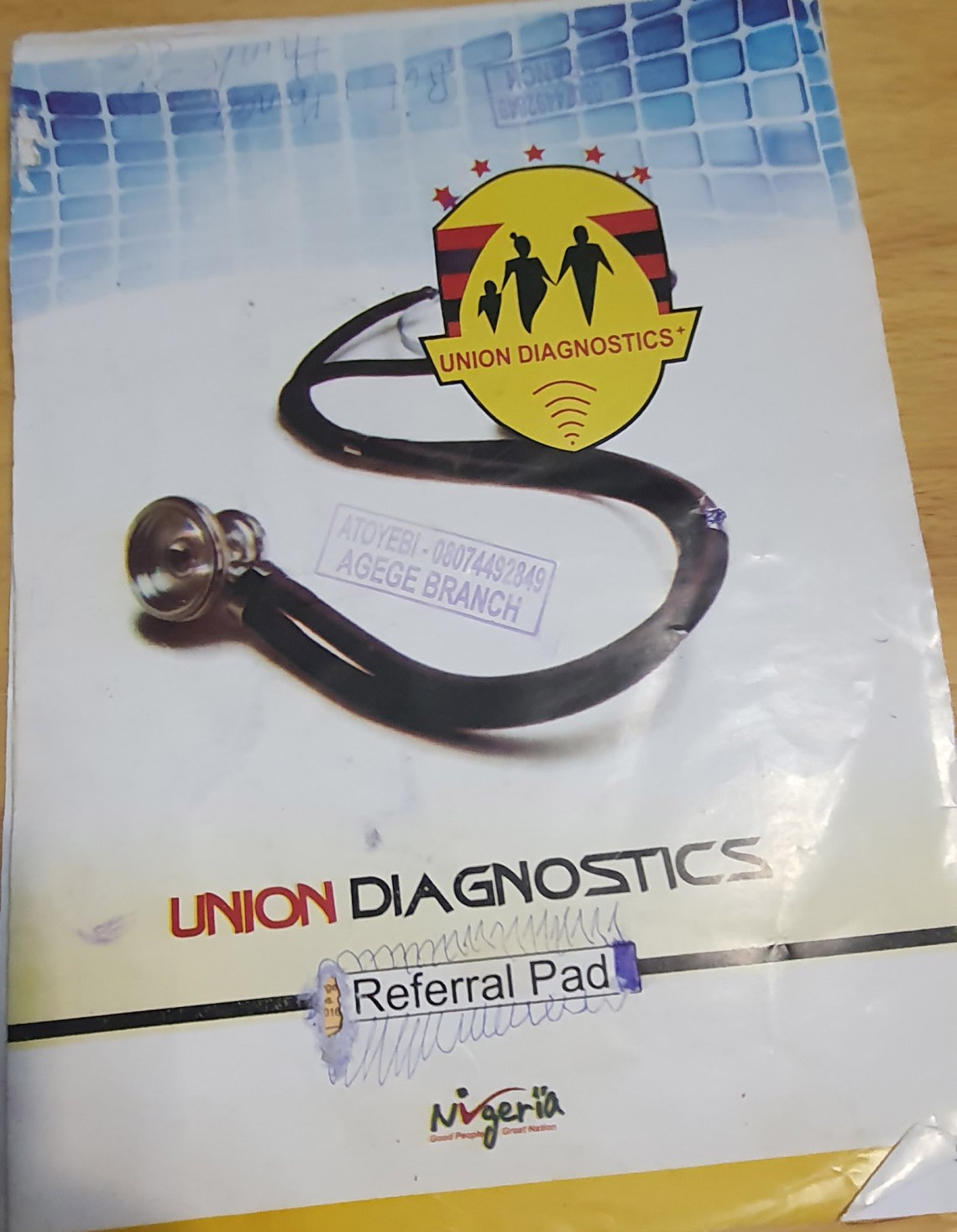
Union Diagnostics did not respond to an email requesting its comment for this investigation. This reporter followed up with a telephone call. Banke Akinsola, an employee of the company who answered the phone, promised that the company’s management would reply to the email. PREMIUM TIMES never got a response from Union Diagnostics.
SYNLAB
SYNLAB, formerly Pathcare, became arguably the largest private medical laboratory provider in the country in 2017 after European diagnostic giant SYNLAB acquired a majority share in the business. The company has at least 29 branches across the country and operates the main medical laboratory at the Lagos University Teaching Hospital (LUTH).
When asked if the company was ready to pay this reporter the standard industry’s 20 per cent kickback, Judith (she did not say her second name), a sales representative for the company, says SYNLAB does not pay rebates, describing it as “a sharp practice.” She, however, explained that that hospital and doctors are at liberty to charge patients more than what the SYNLAB charges for tests.
“We have certain clinics we go to and they say we get a certain amount of cashback from the lab. Because of the international nature of our lab we see it as sharp practice. So what is allowed is this: if a lab feels that they would rather have their client pay a certain amount, what we do is that we send them our price list, we can even bring you sample bottles and sample bags for clinics with a requisition form, what you now do is either you pay us cash SD (special deal, where hospitals can pay at the end of the month).
“You consult with the patient. If the person’s consultation fee is N1,000 and the laboratory test fee is N1200 based on what you are seeing on our price list, whatever amount you want to charge the client, you can go ahead and charge but when a dispatch rider is coming to pick up the sample, you give the dispatch rider the amount or you can transfer the amount for the test.
“If a patient is coming into our facility you can pay upfront before the patient’s arrival. If the person comes to our counter, they will pay N1200 and we would not be obliged to give any money back to the hospital.
“Let’s say a patient wants to do a list of tests, and the total of the test is N10,000; you have an interest to upsell it for N20,000, that is fine,” she said.
When reached for comments, SYNLAB said it is a “trusted provider of diagnostic services” and grounded in the “adherence to international quality standards as well as compliance and adherence to applicable laws without compromise.”
“Claims against SYNLAB Nigeria which constitute a breach of the law or our company policies will be handled according to the processes and actions defined in our company’s policy,” an email signed by Fatimah Akande, the company’s head of Legal and Compliance, said.
What the Law says
The rebate or cut scheme has remained entrenched in the healthcare sector, swindling patients of several billions of naira every year, in blatant disregards of the ethical concern and the criminal implication of the illicit practice.
The Rules of the Professional Conduct for Medical Laboratory Scientist, Laboratory Technicians and Laboratory Assistants (2018) prohibits deceit and extortion of patients.
The rule, published in the Federal Republic of Nigeria Official Gazette No. 86, Vol. 105 on July 3, 2018, says practitioners can be sentenced up to five years in prison if found guilty.
Section 17 of the Rules states:
“Any practitioner who extorts or engage in any act found to be incompatible with the ethics of practise of medical laboratory science with the purpose of extorting from the patient shall be in breach of the Rules of Professional Conduct and shall be guilty of malpractice.
“Any practitioner in breach of sub-rule (1) of this rule shall also be presumed to have contravened the relevant section of the Corrupt Practices and Other Related Offences Act in force and may be guilty of an offence of using his office or position for gratification and shall on conviction be liable to a fine of N100,000.00 or imprisonment for five (5) years for the purpose of these rules or both.”
Similarly, Section 33 of the Code of Medical Ethics of Nigeria forbids doctors from deceiving their patients with the aim of extorting them.
The section, with the heading ‘Deceit of Patient to Extort Fees and Services Charges’ reads:
“A practitioner who keeps a patient in the hospital as an in-patient when it is not necessary or longer than is necessary for good care, or who undertakes to carry out any form of ‘ghost’ procedure including ‘ghost’ and unnecessary investigations, for the sole purpose of increasing his earnings from the patient breaches the Code of Ethics and shall be guilty of malpractice.”
Section 36 of the code also explicitly forbids the physicians from accepting kickbacks from laboratories, chemists and others.
“A practitioner must not circulate professional cards through chemists, opticians, optometrists or insurance agents; nor should he have any commission arrangement with a chemist, optician, optometrist, laboratory or dental technologist, nurse midwife, radiographer, dental therapist and other medical or dental para-professionals or’ insurance agents.”
Furthermore, Section 65 of the code specifically prohibits medical practitioners from soliciting for “unwholesome transactions” such as “arrangement for fee-splitting, which is the practice by the managing practitioner of returning a part of the fee paid by the patient to the referring practitioner, or a third party, with or without the patient’s knowledge,” among other improper financial gratifications.
The section of the code added that the “practice constitutes a threat to the best care of the patient because practitioners would tend to refer patients not to the practitioner with the best facility or skill demanded by the patient’s condition, but to another practitioner who is ready to pay the highest return.”
This investigation by PREMIUM TIMES was reproduced with permission.
2 comments

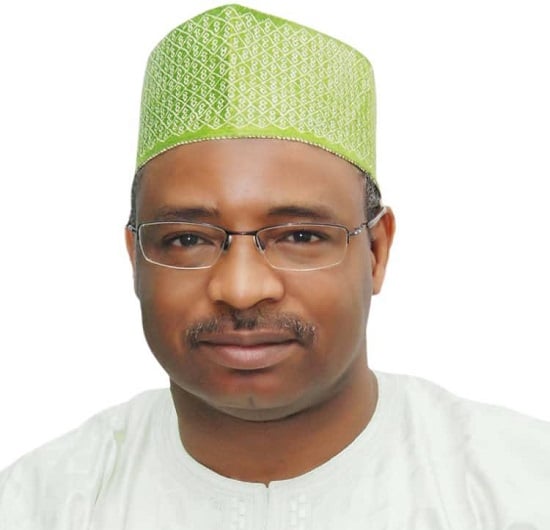
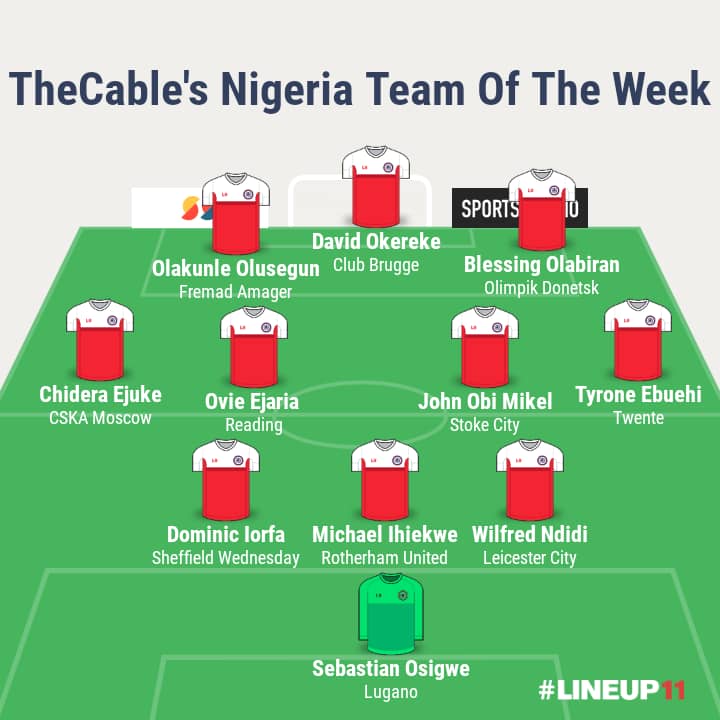
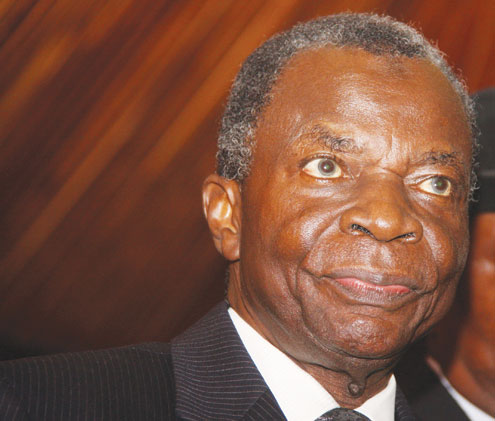
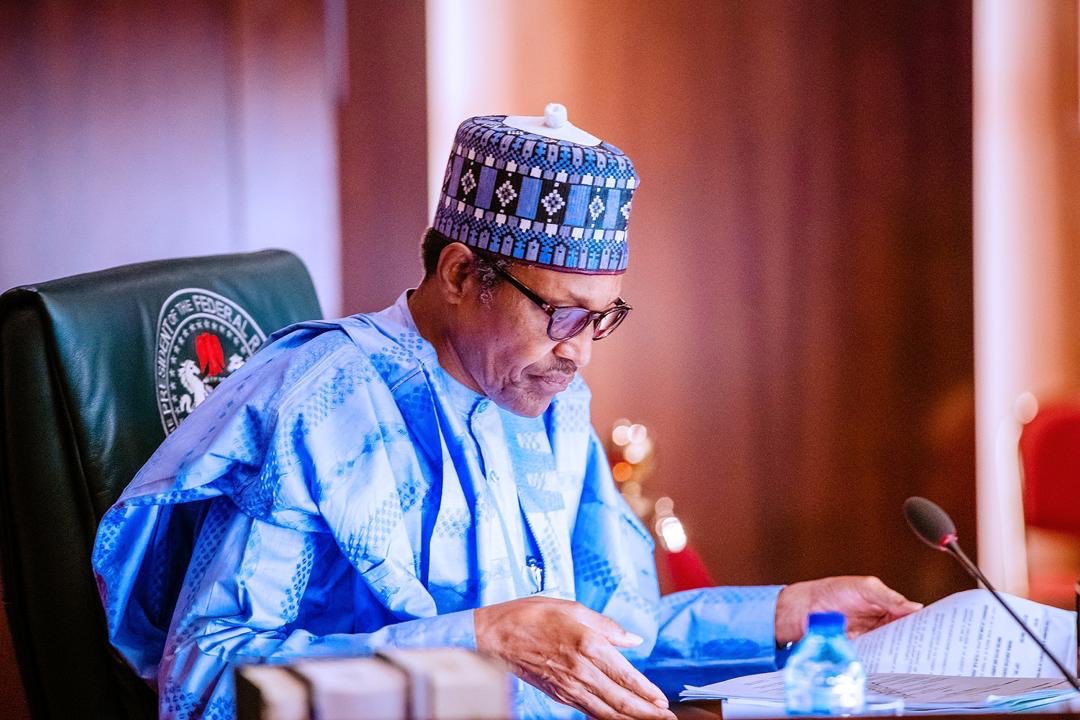
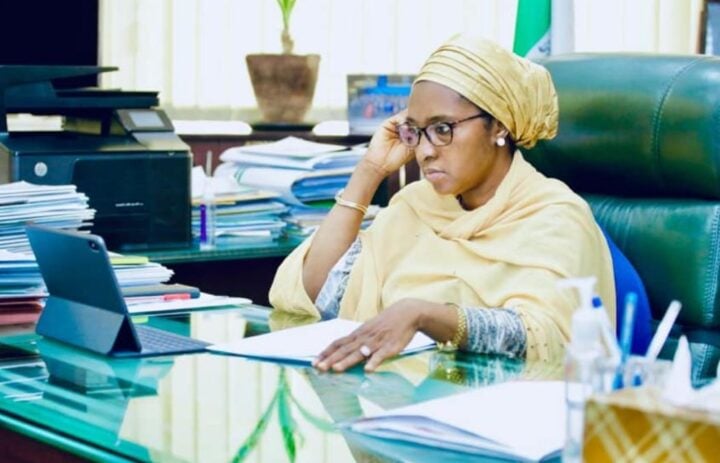
This is excellent journalism.
I’m aware that so many doctors will only refer patients to places where they are assured of kickbacks.
If patients insist on using their preferred providers, the doctors blackmail them into submission by rejecting the test results from the regular, compliant Laboratories.
NHIS is also aiding and abetting this practice.
Enrollees are supposed to select their healthcare providers which include primary and secondary but the NHIS only made provisions for selection of primary provider doctors leaving the Laboratories to scramble and lobby these doctors for patronage.
The Guild of Medical Laboratory Directors GMLD has advised patients and enrollees to select their Laboratory providers independently and insist on using them. They even presented this position before the house committee on health citing ethical regulations but no one acted.
Please dig deeper to unearth more.
The results of most of the tests are unreliable. It’s only Synlab that I can vouch for. May be Clina Lancet but cannot give 100% guarantee.
There is a need to investigate the test results obtained from our diagnostic centers as they are usually trashed abroad